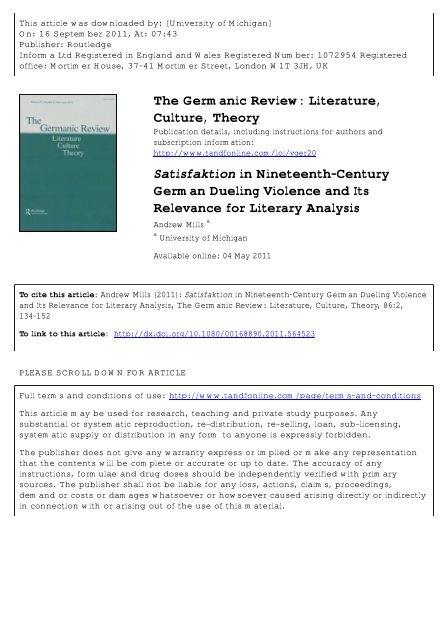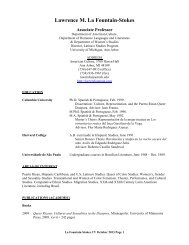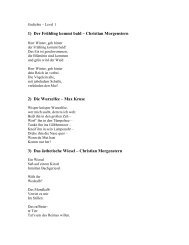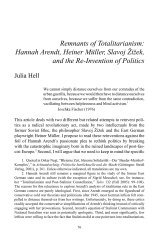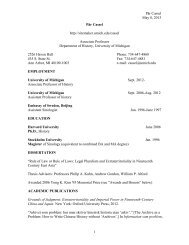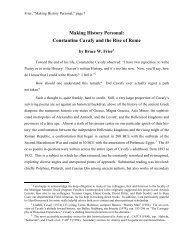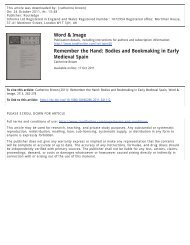Satisfaktion in Nineteenth-Century German Dueling Violence and Its ...
Satisfaktion in Nineteenth-Century German Dueling Violence and Its ...
Satisfaktion in Nineteenth-Century German Dueling Violence and Its ...
You also want an ePaper? Increase the reach of your titles
YUMPU automatically turns print PDFs into web optimized ePapers that Google loves.
This article was downloaded by: [University of Michigan]<br />
On: 16 September 2011, At: 07:43<br />
Publisher: Routledge<br />
Informa Ltd Registered <strong>in</strong> Engl<strong>and</strong> <strong>and</strong> Wales Registered Number: 1072954 Registered<br />
office: Mortimer House, 37-41 Mortimer Street, London W1T 3JH, UK<br />
The <strong>German</strong>ic Review: Literature,<br />
Culture, Theory<br />
Publication details, <strong>in</strong>clud<strong>in</strong>g <strong>in</strong>structions for authors <strong>and</strong><br />
subscription <strong>in</strong>formation:<br />
http://www.t<strong>and</strong>fonl<strong>in</strong>e.com/loi/vger20<br />
<strong>Satisfaktion</strong> <strong>in</strong> N<strong>in</strong>eteenth-<strong>Century</strong><br />
<strong>German</strong> Duel<strong>in</strong>g <strong>Violence</strong> <strong>and</strong> <strong>Its</strong><br />
Relevance for Literary Analysis<br />
Andrew Mills a<br />
a University of Michigan<br />
Available onl<strong>in</strong>e: 04 May 2011<br />
To cite this article: Andrew Mills (2011): <strong>Satisfaktion</strong> <strong>in</strong> N<strong>in</strong>eteenth-<strong>Century</strong> <strong>German</strong> Duel<strong>in</strong>g <strong>Violence</strong><br />
<strong>and</strong> <strong>Its</strong> Relevance for Literary Analysis, The <strong>German</strong>ic Review: Literature, Culture, Theory, 86:2,<br />
134-152<br />
To l<strong>in</strong>k to this article: http://dx.doi.org/10.1080/00168890.2011.564523<br />
PLEASE SCROLL DOWN FOR ARTICLE<br />
Full terms <strong>and</strong> conditions of use: http://www.t<strong>and</strong>fonl<strong>in</strong>e.com/page/terms-<strong>and</strong>-conditions<br />
This article may be used for research, teach<strong>in</strong>g <strong>and</strong> private study purposes. Any<br />
substantial or systematic reproduction, re-distribution, re-sell<strong>in</strong>g, loan, sub-licens<strong>in</strong>g,<br />
systematic supply or distribution <strong>in</strong> any form to anyone is expressly forbidden.<br />
The publisher does not give any warranty express or implied or make any representation<br />
that the contents will be complete or accurate or up to date. The accuracy of any<br />
<strong>in</strong>structions, formulae <strong>and</strong> drug doses should be <strong>in</strong>dependently verified with primary<br />
sources. The publisher shall not be liable for any loss, actions, claims, proceed<strong>in</strong>gs,<br />
dem<strong>and</strong> or costs or damages whatsoever or howsoever caused aris<strong>in</strong>g directly or <strong>in</strong>directly<br />
<strong>in</strong> connection with or aris<strong>in</strong>g out of the use of this material.
Downloaded by [University of Michigan] at 07:43 16 September 2011<br />
The <strong>German</strong>ic Review, 86: 134–152, 2011<br />
Copyright c○ Taylor & Francis Group, LLC<br />
ISSN: 0016-8890 pr<strong>in</strong>t / 1930-6962 onl<strong>in</strong>e<br />
DOI: 10.1080/00168890.2011.564523<br />
<strong>Satisfaktion</strong> <strong>in</strong> N<strong>in</strong>eteenth-<strong>Century</strong> <strong>German</strong><br />
Duel<strong>in</strong>g <strong>Violence</strong> <strong>and</strong> <strong>Its</strong> Relevance<br />
for Literary Analysis<br />
Andrew Mills<br />
This article exam<strong>in</strong>es the oft-cited, yet frequently underanalyzed notion of <strong>Satisfaktion</strong><br />
<strong>in</strong> n<strong>in</strong>eteenth-century <strong>German</strong>ic culture <strong>and</strong> society, <strong>and</strong> aims to establish a concise<br />
underst<strong>and</strong><strong>in</strong>g of the term for the study of <strong>German</strong>-language fiction. In the article, I<br />
analyze the <strong>German</strong>ic conceptualization of <strong>Satisfaktion</strong> (Genugtuung) <strong>and</strong> propose a set<br />
of term<strong>in</strong>ological parameters that underscore this concept’s central role <strong>in</strong> literary scenes<br />
<strong>in</strong> which duel<strong>in</strong>g violence threatens. My analysis elucidates the predom<strong>in</strong>antly nonviolent<br />
nature of <strong>Satisfaktion</strong>, as well as the overemphasis scholars traditionally have placed on<br />
its violent render<strong>in</strong>g. I submit that analyses of n<strong>in</strong>eteenth-century literature benefit from a<br />
reassessment <strong>and</strong> clarification of the term. As I demonstrate <strong>in</strong> my read<strong>in</strong>g of Hoffmann’s<br />
The S<strong>and</strong>man, a salient conceptualization of <strong>Satisfaktion</strong> can result <strong>in</strong> a markedly different,<br />
entirely defensible <strong>in</strong>terpretation of the motivations <strong>and</strong> behavior of the protagonists. The<br />
clarification of <strong>Satisfaktion</strong> further prevents misread<strong>in</strong>g many canonical works as be<strong>in</strong>g<br />
“anti-duel” <strong>in</strong> essence, despite their apparent critique of the practice.<br />
Keywords: duel<strong>in</strong>g, Genugtuung, honor, literary analysis, <strong>Satisfaktion</strong>, violence<br />
T<br />
he duel’s image <strong>in</strong> the present-day <strong>German</strong> studies canon of n<strong>in</strong>eteenth-century literature<br />
is nearly universally pejorative, with the duel consistently portrayed <strong>in</strong> tragic,<br />
renunciative, or satirical terms. Approximations of this claim have been made already by<br />
scholars such as Peter Gay (98–99), Andrew Wisely (81–82), <strong>and</strong> Bernhard Schl<strong>in</strong>k (378–81).<br />
I argue, however, that this scholarship has failed to recognize the extent to which duel-critical<br />
literature is unable to imag<strong>in</strong>e a viable alternative to duel<strong>in</strong>g for its protagonists. A nuanced<br />
underst<strong>and</strong><strong>in</strong>g of the historical notion of <strong>Satisfaktion</strong> reveals the conformity of such works<br />
to the very mascul<strong>in</strong>e-honor-codex precepts that fueled duel<strong>in</strong>g violence. I locate no conceptually<br />
viable literary critique of the duel <strong>in</strong> the traditional canon of <strong>German</strong> literature of the<br />
long n<strong>in</strong>eteenth century <strong>and</strong> ground this conclusion <strong>in</strong> the <strong>in</strong>ability of the period’s literature to<br />
depict an “escape” from the entrenched social compulsion to dem<strong>and</strong> or render <strong>Satisfaktion</strong>.<br />
134
Downloaded by [University of Michigan] at 07:43 16 September 2011<br />
MILLS SATISFAKTION 135<br />
In this article, I draw on examples of <strong>in</strong>terpersonal conflict amongst honor-bound<br />
males from the work <strong>and</strong> lives of a spectrum of n<strong>in</strong>eteenth-century writers, <strong>in</strong>clud<strong>in</strong>g Johann<br />
Wolfgang von Goethe, Eduard Devrient, E. T. A. Hoffmann, <strong>and</strong> Theodor Herzl. I discuss<br />
these specific cases as opposed to numerous other available literary manifestations of duel<strong>in</strong>g<br />
<strong>and</strong> satisfaction because I view the former as produc<strong>in</strong>g the most salient examples of particular<br />
problems I wish to exam<strong>in</strong>e. Other <strong>in</strong>stances <strong>in</strong>volv<strong>in</strong>g satisfaction <strong>and</strong> duel<strong>in</strong>g <strong>in</strong> the literary<br />
record are addressed as extensively as possible <strong>in</strong> the footnotes. In the follow<strong>in</strong>g, I first trace<br />
the historical <strong>and</strong> etymological trajectory of the concept of <strong>Satisfaktion</strong> before reassess<strong>in</strong>g<br />
the term <strong>and</strong> demonstrat<strong>in</strong>g its value for literary analysis.<br />
AMULTITIERED CONCEPTUALIZATION OF SATISFAKTION (GENUGTUUNG)<br />
My proposal to explore the n<strong>in</strong>eteenth-century <strong>German</strong> duel through the lens of <strong>Satisfaktion</strong><br />
is motivated by this historical concept’s dist<strong>in</strong>ctiveness <strong>and</strong> <strong>in</strong>herent complexity. Although<br />
the ritualistic practice of the <strong>German</strong> honor duel is a relic of bygone times—reserved for that<br />
privileged m<strong>in</strong>ority of males who qualified as “satisfaction capable” (satisfaktionsfähig) on<br />
account of aristocratic ancestry, membership to the officer corps or to a “fenc<strong>in</strong>g” fraternity,<br />
or by merit of hav<strong>in</strong>g achieved a particular social rank—the <strong>in</strong>timately related concepts of<br />
honor <strong>and</strong> mascul<strong>in</strong>ity cont<strong>in</strong>ue to f<strong>in</strong>d sustenance <strong>in</strong> Western societies alongside diverse<br />
manifestations of <strong>in</strong>termale violence. 1 It is noteworthy that alone the notion of “dem<strong>and</strong><strong>in</strong>g”<br />
or “grant<strong>in</strong>g” satisfaction <strong>in</strong> response to a perceived <strong>in</strong>sult or offense is as qua<strong>in</strong>t <strong>and</strong><br />
anachronistic as the pistol duel itself.<br />
<strong>Satisfaktion</strong> as a historical term has been underscrut<strong>in</strong>ized <strong>in</strong> scholarly studies <strong>and</strong><br />
is rarely discussed <strong>in</strong> a nuanced, term<strong>in</strong>ological fashion. Even meticulous <strong>and</strong> deservedly<br />
well-received monographs by Ute Frevert, Kev<strong>in</strong> McAleer, <strong>and</strong> Norbert Elias utilize the<br />
term <strong>in</strong> a manner that most frequently appears to identify it as “that which is dem<strong>and</strong>ed<br />
or given” when a socially qualified male’s sense of honor is <strong>in</strong>jured. 2 This tendency leads<br />
to the common assumption that <strong>Satisfaktion</strong> signifies a request to <strong>in</strong>itiate ritualized duel<strong>in</strong>g<br />
violence. In place of this characterization, I classify <strong>Satisfaktion</strong> as a dynamic, multilayered<br />
concept <strong>and</strong> wish to formalize our underst<strong>and</strong><strong>in</strong>g of the term by dist<strong>in</strong>guish<strong>in</strong>g between three<br />
1 See Bay.<br />
2 Kiernan, for example, renders the term vague treatment <strong>in</strong> his 1988 monograph, <strong>in</strong>terpret<strong>in</strong>g it as a<br />
call for s<strong>in</strong>gle combat <strong>in</strong> response to an <strong>in</strong>sult (13–14). The essence of Genugtuung (<strong>Satisfaktion</strong>) is not<br />
articulated <strong>in</strong> Frevert’s groundbreak<strong>in</strong>g Men of Honour, despite the work’s discussion of satisfactioncapable<br />
circles <strong>in</strong> n<strong>in</strong>eteenth-century middle-class society. This assertion is valid also for other <strong>in</strong>stances<br />
<strong>in</strong> which Frevert directly addresses <strong>Satisfaktion</strong>, such as <strong>in</strong> the essay “Bourgeois” or “Der ‘Louis.’“<br />
McAleer refra<strong>in</strong>s from def<strong>in</strong><strong>in</strong>g <strong>Satisfaktion</strong> <strong>in</strong> his work Duel<strong>in</strong>g, although he appears to recognize<br />
its predom<strong>in</strong>antly nonviolent character. Gelber conta<strong>in</strong>s the chapter “<strong>Satisfaktion</strong>sfähigkeit <strong>and</strong> Jewish<br />
Pride” <strong>in</strong> which the term <strong>Satisfaktion</strong> is not def<strong>in</strong>ed. Wisely first uses the term <strong>in</strong> the context of the plural<br />
noun <strong>Satisfaktion</strong>sfähigen, which passes without def<strong>in</strong>ition or explication. Elias addresses the concept<br />
of <strong>Satisfaktion</strong>. However, he does not clarify the term, despite the prom<strong>in</strong>ence of its treatment <strong>in</strong> the<br />
chapter 1 subsection entitled “Duel<strong>in</strong>g <strong>and</strong> Membership of the Imperial Rul<strong>in</strong>g Class: Dem<strong>and</strong><strong>in</strong>g <strong>and</strong><br />
Giv<strong>in</strong>g Satisfaction.”
Downloaded by [University of Michigan] at 07:43 16 September 2011<br />
136 THE GERMANIC REVIEW VOLUME 86, NUMBER 2 / 2011<br />
dist<strong>in</strong>ct levels <strong>in</strong>herent to it. I then undertake close read<strong>in</strong>gs of canonical literary works that<br />
thematize honor violence <strong>in</strong> order to highlight this historical concept’s usefulness for the<br />
study of literature.<br />
An exam<strong>in</strong>ation of eighteenth- through twentieth-century <strong>German</strong> lexical <strong>and</strong> encyclopedic<br />
treatment of <strong>Satisfaktion</strong>, whose Lat<strong>in</strong> derivation of satis [ = genug] <strong>and</strong> facere<br />
[ = tun] produces the <strong>German</strong>ic Genugtuung, reveals that the two terms were once generally<br />
synonymous, develop<strong>in</strong>g <strong>in</strong>to dist<strong>in</strong>ct concepts over the course of the n<strong>in</strong>eteenth century. 3<br />
Genugtuung referenced either nonviolent, juridical means of restitution or Christian theological<br />
dogma <strong>and</strong> signified duel<strong>in</strong>g violence only <strong>in</strong> a secondary manner as a means of<br />
recompens<strong>in</strong>g honor-related <strong>in</strong>sults. By the close of the n<strong>in</strong>eteenth century, <strong>Satisfaktion</strong> had<br />
asserted itself as a separate lexical entry without such supplementary def<strong>in</strong>itions of a legal,<br />
theological, or abstract nature, <strong>and</strong> is obta<strong>in</strong>able via two paths: peaceful Revokation<br />
or Abbitte (the “withdrawal of,” or “apology for,” an <strong>in</strong>sult, respectively), or through the<br />
more om<strong>in</strong>ous act of sich stellen (“physically present<strong>in</strong>g oneself at a duel, <strong>and</strong> ‘st<strong>and</strong><strong>in</strong>g<br />
<strong>in</strong>’ for the offense”). 4 As the twentieth century progressed, <strong>Satisfaktion</strong> reta<strong>in</strong>ed its late<br />
n<strong>in</strong>eteenth-century character <strong>in</strong> represent<strong>in</strong>g both the nonviolent <strong>and</strong> duel<strong>in</strong>g placation of an<br />
offended party, whereas Genugtuung morphed <strong>in</strong>to an entirely nonduel-oriented redress of a<br />
transgression. 5<br />
A basel<strong>in</strong>e underst<strong>and</strong><strong>in</strong>g of n<strong>in</strong>eteenth-century <strong>Satisfaktion</strong> therefore acknowledges<br />
its signification of Genugtuung (the restitution for an <strong>in</strong>sult or offense) by means of either<br />
an Ehrenerklärung or Zweikampf ,whereEhrenerklärung refers to the nonviolent “public<br />
retraction of an <strong>in</strong>sult or sl<strong>and</strong>erous claim” (Duden Deutsches 389, my translation). The<br />
dem<strong>and</strong> for <strong>Satisfaktion</strong> <strong>in</strong> the wake of a perceived transgression can be, therefore, an entirely<br />
nonviolent affair that merely refers to the request for an Ehrenerklärung—the explicit, public<br />
withdrawal of the <strong>in</strong>sult—or a suitable apology, known as the aforementioned Abbitte or<br />
as Deprezieren. I characterize this nonviolent possibility as “first-order” <strong>Satisfaktion</strong>, asit<br />
represents the <strong>in</strong>itial stage <strong>in</strong> an “honor situation” or confrontation <strong>in</strong> which one satisfactionqualified<br />
male perceives himself offended by another <strong>and</strong> f<strong>in</strong>ds himself socially obligated<br />
to dem<strong>and</strong> some form of <strong>Satisfaktion</strong> befitt<strong>in</strong>g the seriousness of the offense. First-order<br />
satisfaction also represents the most salient <strong>and</strong> readily comprehensible stage at which the<br />
majority of honor conflicts are remedied.<br />
When an <strong>in</strong>dividual dem<strong>and</strong>s <strong>Satisfaktion</strong> from a fellow honor-bound male by whom<br />
he perceives himself to have been offended, the <strong>in</strong>sulted party is dem<strong>and</strong><strong>in</strong>g redress by<br />
means of a public retraction of the <strong>in</strong>sult <strong>in</strong> a manner he deems acceptable. Only if this<br />
withdrawal or apology rema<strong>in</strong>s outst<strong>and</strong><strong>in</strong>g does the <strong>in</strong>sulted party’s dem<strong>and</strong> for <strong>Satisfaktion</strong><br />
shift to a second, dist<strong>in</strong>ctly different level. An exemplary canonical demonstration of the<br />
function of the Ehren(erklärung) is found <strong>in</strong> Goethe’s tragedy Clavidgo (1774), where the<br />
ascendant writer Joseph Clavidgo is confronted by the enraged brother of Marie Beaumarchais,<br />
whom Clavidgo promised marriage <strong>and</strong> subsequently ab<strong>and</strong>oned, thereby seriously<br />
3See, for <strong>in</strong>stance, Zedler; He<strong>in</strong>sius; Grimm <strong>and</strong> Grimm; <strong>and</strong> Brockhaus’ Konversations-Lexikon.<br />
4See Brockhaus’ Konversations-Lexikon <strong>and</strong> Meyers Lexikon (1929).<br />
5See Meyers Enzyklopädisches Lexikon; Duden: Das große Wörterbuch; Duden Deutsches; Brockhaus<br />
Wahrig; <strong>and</strong> Brockhaus, Die Enzyklopädie.
Downloaded by [University of Michigan] at 07:43 16 September 2011<br />
MILLS SATISFAKTION 137<br />
endanger<strong>in</strong>g her public reputation. The brother Beaumarchais’s dem<strong>and</strong> for an Erklärung<br />
from Clavidgo epitomizes the essence of first-order <strong>Satisfaktion</strong>, which at its core consists<br />
of a public acknowledgement <strong>and</strong> retraction of the offender’s <strong>in</strong>sult<strong>in</strong>g conduct (Goethe 27).<br />
In addition to these necessary characteristics of public acknowledgement <strong>and</strong> retraction, the<br />
Ehrenerklärung must clear the offended party of wrongdo<strong>in</strong>g, as Goethe literally spells out<br />
through Clavidgo’s written declaration: “I have deserted her, without one fault or weakness<br />
on her part, which could afford any colour or excuse for this perjury. . . . On the contrary the<br />
conduct of the lady is wholly pure, irreproachable, <strong>and</strong> worthy of all reverence” (35).<br />
A f<strong>in</strong>al component of the Ehrenerklärung is its delivery under the latent threat of the<br />
honor situation progress<strong>in</strong>g to a decidedly more om<strong>in</strong>ous level of <strong>Satisfaktion</strong>, should the<br />
declaration not be forthcom<strong>in</strong>g. When a recalcitrant Clavidgo <strong>in</strong>itially resists the notion of<br />
writ<strong>in</strong>g the requested Erklärung <strong>and</strong> h<strong>in</strong>ts at the possibility of a duel, for <strong>in</strong>stance, the brother<br />
Beaumarchais replies, “Good, Sir! Right, Sir!” <strong>and</strong> demonstrates a read<strong>in</strong>ess to accommodate<br />
the writer (31). Clavidgo, not desir<strong>in</strong>g bloodshed, at this po<strong>in</strong>t agrees to write the statement<br />
(32–33). This feature of the Ehrenerklärung underscores its role <strong>in</strong> an honor situation as the<br />
last, salient procedural barrier aga<strong>in</strong>st duel<strong>in</strong>g violence.<br />
What I term second-order <strong>Satisfaktion</strong> bridges the “violence gap” between the strictly<br />
peaceful <strong>Satisfaktion</strong> of the first level <strong>and</strong> the unmitigated duel<strong>in</strong>g violence of the third <strong>and</strong>,<br />
thus, represents a further, dist<strong>in</strong>ct possibility with<strong>in</strong> the conf<strong>in</strong>es of this concept. This second<br />
<strong>in</strong>stantiation is verifiable through the historical record <strong>in</strong> the form of various case studies<br />
<strong>and</strong> is also embedded <strong>in</strong> n<strong>in</strong>eteenth-century <strong>German</strong> literature, as I discuss <strong>in</strong> detail below.<br />
Second-order <strong>Satisfaktion</strong>’s term<strong>in</strong>ological articulation can be found <strong>in</strong> contemporary sources<br />
such as Johann He<strong>in</strong>rich Zedler’s Grosses Vollständiges Universal-Lexikon from 1742, which<br />
def<strong>in</strong>es violent satisfaction <strong>in</strong> terms of “sich stellen” at a proposed duel, which need not entail<br />
the actual act of duel<strong>in</strong>g: “ ... to give someone satisfaction, ... this means to satisfy one’s<br />
<strong>in</strong>sulted enemy <strong>and</strong> challenger with sword or pistol, <strong>and</strong> to st<strong>and</strong> at the proposed duel”<br />
(188, my translation). 6 Similarly, the 1908 Brockhaus’ Konversations-Lexikon notes that a<br />
state of Genugtuung can be achieved through one’s act of “st<strong>and</strong><strong>in</strong>g” or “tak<strong>in</strong>g up position<br />
at a duel” (331, my translation). 7 A twentieth-century echo of this long-n<strong>in</strong>eteenth-century<br />
lexical underst<strong>and</strong><strong>in</strong>g is found <strong>in</strong> Duden’s Das große Wörterbuch der deutschen Sprache<br />
<strong>and</strong> Deutsches Universal Wörterbuch, from 1977–80 <strong>and</strong> 1996 respectively, which def<strong>in</strong>e<br />
<strong>Satisfaktion</strong> as the “withdrawal of an <strong>in</strong>sult, or someth<strong>in</strong>g similar, through one’s read<strong>in</strong>ess to<br />
duel” (Wörterbuch 2219; Deutsches 1293, my translation).<br />
In a model of <strong>Satisfaktion</strong> that has been exp<strong>and</strong>ed to accommodate a second, bridg<strong>in</strong>g<br />
level, the withdrawal of an <strong>in</strong>sult can be atta<strong>in</strong>ed either via the nonviolent Ehrenerklärung,the<br />
demonstrated read<strong>in</strong>ess or will<strong>in</strong>gness to duel, or through duel<strong>in</strong>g violence itself. This more<br />
nuanced formulation of <strong>Satisfaktion</strong> expla<strong>in</strong>s functional work<strong>in</strong>gs of the honor-duel process<br />
that rema<strong>in</strong> largely unaddressed <strong>in</strong> scholarship. Examples <strong>in</strong>clude the dem<strong>and</strong> for satisfaction<br />
through duel<strong>in</strong>g that is issued <strong>and</strong> accepted yet ultimately permanently impeded by circumstances<br />
beyond the control of the <strong>in</strong>sult<strong>in</strong>g party, such as death, debilitat<strong>in</strong>g sickness, or some<br />
6 “ ...e<strong>in</strong>em Satisfaction geben ... das ist, se<strong>in</strong>em beleidigten Fe<strong>in</strong>de und Ausforderer mit dem Degen<br />
oder Pistolen Genüge leisten, und zum angetragenen Duell sich stellen.”<br />
7 “Stellen zum Duell.”
Downloaded by [University of Michigan] at 07:43 16 September 2011<br />
138 THE GERMANIC REVIEW VOLUME 86, NUMBER 2 / 2011<br />
other <strong>in</strong>terven<strong>in</strong>g event. 8 In this case, violent satisfaction for a grievous offense has not been<br />
granted, yet there is no historical evidence to suggest that the unremunerated offended party<br />
would be deemed permanently dishonored <strong>and</strong> therefore no longer satisfaction-qualified.<br />
Second-order satisfaction further expla<strong>in</strong>s the appearance of would-be duelists at the site of<br />
an impend<strong>in</strong>g duel who, hav<strong>in</strong>g displayed outward disregard for bodily harm or death until<br />
that moment, manage to achieve reconciliation before the commencement of combat, with<br />
both sides deem<strong>in</strong>g <strong>Satisfaktion</strong> to have been rendered.<br />
This variation of satisfaction, I contend, follows from the <strong>in</strong>sulter’s outward display<br />
of read<strong>in</strong>ess to risk his life by duel<strong>in</strong>g the man whom he <strong>in</strong>sulted—an act dist<strong>in</strong>ct from<br />
the first-order Revokation or Abbitte that could transpire without peril <strong>in</strong> a coffee house.<br />
The will<strong>in</strong>gness to duel that is <strong>in</strong>herent to second-order satisfaction revokes the <strong>in</strong>sult ipso<br />
facto by means of its unmitigated acknowledgment that the <strong>in</strong>sulter recognizes the offended<br />
as his social equal. In this moment, satisfaction is “achieved”; it is not the physical act of<br />
duel<strong>in</strong>g that revokes the offense, but the act of the offender replac<strong>in</strong>g his <strong>in</strong>sult with his<br />
own physical presence <strong>in</strong> the impend<strong>in</strong>g perilous <strong>and</strong> ultimately <strong>in</strong>calculable rite of s<strong>in</strong>gle<br />
combat. The <strong>in</strong>sult that is grave enough to precipitate a duel, such as one man call<strong>in</strong>g another<br />
a coward, subsequently could not be asserted at the site of the duel if the <strong>in</strong>sult were not<br />
revocable through this demonstrated will<strong>in</strong>gness—otherwise the <strong>in</strong>sulter’s presence on the<br />
duel<strong>in</strong>g grounds would represent a tacit admission that he is lower<strong>in</strong>g himself to duel the<br />
very <strong>in</strong>dividual he labeled a coward. As we shall see below, this <strong>in</strong>sight will play a key role<br />
<strong>in</strong> my read<strong>in</strong>g of the duel<strong>in</strong>g scene <strong>in</strong> The S<strong>and</strong>man.<br />
An <strong>in</strong>structive literary manifestation of second-order <strong>Satisfaktion</strong> is provided by a scene<br />
from Eduard Devrient’s 1836 drama The Grace of the Moment (Die Gunst des Augenblicks). 9<br />
Respond<strong>in</strong>g to Herr von Kiel’s coarse behavior toward Fräule<strong>in</strong> Ernest<strong>in</strong>e, the L<strong>and</strong>rath<br />
Brückner angers his rival by stat<strong>in</strong>g <strong>in</strong> the woman’s presence: “Your conduct is entirely<br />
undignified, Herr von Kiel” (208). Incensed, von Kiel dem<strong>and</strong>s satisfaction. The figure of<br />
Brückner, who f<strong>in</strong>ds duel<strong>in</strong>g to be a tasteless, foolish endeavor, <strong>and</strong> who repeatedly expresses<br />
this sentiment, <strong>in</strong>itially resists Herr von Kiel’s calls for satisfaction, but eventually f<strong>in</strong>ds<br />
himself unnerved by von Kiel’s verbal affronts. Brückner at last relents <strong>and</strong> accepts a duel<strong>in</strong>g<br />
pistol—now as the offended party, as the text makes clear, because of von Kiel’s persistent<br />
<strong>in</strong>sults—<strong>and</strong> purposely fires over von Kiel’s head before cooly await<strong>in</strong>g the return shot.<br />
After aim<strong>in</strong>g a few moments, however, von Kiel lowers his pistol <strong>and</strong> “accepts” Brückner’s<br />
“satisfaction” (Devrient 213).<br />
Devrient’s passage not only demonstrates the function<strong>in</strong>g of second-order satisfaction,<br />
it depicts an <strong>in</strong>dividual purposefully shoot<strong>in</strong>g errantly, thus illum<strong>in</strong>at<strong>in</strong>g the additional,<br />
paradoxical danger of los<strong>in</strong>g one’s social status by display<strong>in</strong>g read<strong>in</strong>ess to duel by fir<strong>in</strong>g<br />
errantly—out of unwill<strong>in</strong>gness to shed blood. Individuals who purposefully shot astray were<br />
held <strong>in</strong> contempt by <strong>German</strong> duel<strong>in</strong>g purists of the n<strong>in</strong>eteenth century, due to the fact that<br />
8 In Less<strong>in</strong>g’s tragedy Emilia Galotti (1772) for <strong>in</strong>stance, Graf Appiani <strong>in</strong>sults Mar<strong>in</strong>elli yet dies at the<br />
h<strong>and</strong>s of Mar<strong>in</strong>elli’s assass<strong>in</strong>s before he can render the satisfaction that Mar<strong>in</strong>elli expressly dem<strong>and</strong>s<br />
<strong>and</strong> appears to authentically desire (324–25).<br />
9 The follow<strong>in</strong>g translations of Devrient’s work are my own.
Downloaded by [University of Michigan] at 07:43 16 September 2011<br />
MILLS SATISFAKTION 139<br />
their behavior was “perceived as a craven show of clemency <strong>in</strong> the hope that the gesture<br />
would be returned” (McAleer 69).<br />
Although Devrient’s text makes explicit that, as the <strong>in</strong>sulted party, Brückner enjoys<br />
the advantage of fir<strong>in</strong>g first, he uses his turn to fire astray. Herr von Kiel, an ardent supporter<br />
of the duel<strong>in</strong>g codex “laws of honor” (210), clearly views Brückner’s <strong>in</strong>tentional miss as<br />
illegitimate:<br />
HERR VON KIEL. You did not aim at me!<br />
LANDRATH. No, as I told you, I shoot at no man.<br />
HERR VON KIEL. I must <strong>in</strong>form you that we are not fac<strong>in</strong>g each other for the<br />
purpose of a joke, <strong>and</strong> that I shall not return this consideration.<br />
LANDRATH. I was not try<strong>in</strong>g to <strong>in</strong>duce you to any such th<strong>in</strong>g; shoot. (212)<br />
Satisfaction was not felt to be obta<strong>in</strong>ed by many <strong>German</strong> duelists whose opponents purposely<br />
fired astray, as this act necessarily dim<strong>in</strong>ished these duelists’ perception of their opponent’s<br />
s<strong>in</strong>cere read<strong>in</strong>ess to duel. Such a well-mean<strong>in</strong>g gesture on the part of the errant shooter<br />
even could lead to further <strong>in</strong>sult<strong>in</strong>g one’s opponent through the perceived suggestion that the<br />
shooter did not consider his opponent courageous enough to face an aimed bullet. Moreover,<br />
if each duelist chose to fire over the other’s head, both could be found contemptible <strong>and</strong> no<br />
longer worthy of <strong>Satisfaktion</strong> by fellow satisfaction-capable witnesses. In this case, each of<br />
the duelists would be deemed no longer satisfaction-qualified because of his outward display<br />
of unwill<strong>in</strong>gness to duel.<br />
At this juncture, von Kiel <strong>in</strong>deed does not perceive himself as hav<strong>in</strong>g received the<br />
necessary <strong>Satisfaktion</strong> <strong>and</strong>, verbally assured by Brückner that the latter is not mak<strong>in</strong>g a<br />
“show of clemency” <strong>in</strong> hopes that von Kiel would return the favor, the nobleman prepares to<br />
fire:<br />
HERR VON KIEL aims a long while, lowers the pistol. [...] Aga<strong>in</strong>, do you<br />
wish to retract your statements without more ado?<br />
LANDRATH. I told you my conditions, just shoot.<br />
Herr von Kiel prepares to fire. Pause. [ ...]<br />
HERR VON KIEL. I do not wish to; I am satisfied. You are a man whose heart<br />
is <strong>in</strong> the right place. [ ...] I accept your offer of satisfaction. (213)<br />
Herr von Kiel’s acknowledgement of Brückner’s “offer of satisfaction” transpires despite<br />
the latter’s own dista<strong>in</strong> for duel<strong>in</strong>g <strong>and</strong> lack of allegiance to the notion. More importantly,<br />
Devrient’s drama allows us to locate the <strong>Satisfaktion</strong> rendered by Brückner <strong>in</strong> precisely those<br />
moments dur<strong>in</strong>g which he awaits von Kiel’s shot. Here we note that Brückner’s behavior does<br />
not constitute first-order satisfaction, as Brückner expressly refuses to revoke or apologize for<br />
his statements. We see that Brückner’s actions, likewise, do not fall under the classification<br />
of violent, third-order satisfaction, as Herr von Kiel refuses to acknowledge the lethality,<br />
seriousness, or procedural legitimacy of his opponent’s errant shot.<br />
Brückner’s second-order read<strong>in</strong>ess to duel is, strictly speak<strong>in</strong>g, read<strong>in</strong>ess to engage <strong>in</strong> a<br />
bout <strong>in</strong>sofar as von Kiel’s return shot can be considered the act that would have completed the
Downloaded by [University of Michigan] at 07:43 16 September 2011<br />
140 THE GERMANIC REVIEW VOLUME 86, NUMBER 2 / 2011<br />
“duel”: upon von Kiel’s fir<strong>in</strong>g, each man would have once faced the barrel of an opponent’s<br />
weapon <strong>and</strong> each would have discharged his own—objections from <strong>German</strong> duel<strong>in</strong>g manuals<br />
of the time notwithst<strong>and</strong><strong>in</strong>g. Indeed, this latter question of how <strong>German</strong> duel<strong>in</strong>g codices would<br />
have evaluated Brückner’s <strong>in</strong>tentional miss is adeptly side-stepped by the narration <strong>in</strong> that<br />
no mention is made of any satisfaction-capable witnesses to the scene. In this way, neither<br />
man need worry about possible negative social consequences for consider<strong>in</strong>g the matter<br />
concluded.<br />
In Devrient’s drama, reconciliation results neither from a first-order Revokation nor a<br />
duel but an underst<strong>and</strong><strong>in</strong>g of <strong>Satisfaktion</strong> that recognizes the possibility of revok<strong>in</strong>g an <strong>in</strong>sult<br />
by demonstrably “st<strong>and</strong><strong>in</strong>g <strong>in</strong>” for the offense at the site of the duel. This physical st<strong>and</strong><strong>in</strong>g<strong>in</strong><br />
for the <strong>in</strong>sult retracts it <strong>in</strong> the same manner as would an apology or withdrawal; thus,<br />
satisfaction is considered “granted,” <strong>and</strong> reconciliation becomes possible. It is crucial to note<br />
that only third-order satisfaction revokes an <strong>in</strong>sult by means of duel<strong>in</strong>g violence itself. As I<br />
observe below, it is the severe over-extension of this third-level underst<strong>and</strong><strong>in</strong>g of satisfaction<br />
that led to <strong>Satisfaktion</strong> becom<strong>in</strong>g a source of social tyranny for n<strong>in</strong>eteenth-century men of<br />
privilege.<br />
THE TYRANNY OF VIOLENT SATISFACTION<br />
The notion of <strong>Satisfaktion</strong> was <strong>in</strong>tegral to the process of reestablish<strong>in</strong>g one’s honor after<br />
be<strong>in</strong>g <strong>in</strong>sulted by a fellow honor-bound male, as satisfaction denotes the very act of revok<strong>in</strong>g<br />
or withdraw<strong>in</strong>g the offense. In n<strong>in</strong>eteenth-century satisfaction-capable circles, the concept<br />
of <strong>Satisfaktion</strong> assumed the role of a tyrannical force by pressur<strong>in</strong>g many men to perceive<br />
any <strong>in</strong>sult as a suggestion of cowardice, to be met with the most extreme demonstration of<br />
personal courage on the duel<strong>in</strong>g grounds. The satisfaction these men so often had <strong>in</strong> m<strong>in</strong>d<br />
did not conform to the longst<strong>and</strong><strong>in</strong>g, tacit underst<strong>and</strong><strong>in</strong>g of Genugtuung/<strong>Satisfaktion</strong> as the<br />
withdrawal of an <strong>in</strong>sult by multiple, <strong>and</strong> not necessarily violent, means, but <strong>in</strong>stead signified<br />
third-order satisfaction—that of s<strong>in</strong>gle-combat. The “tyranny” aspect of satisfaction’s social<br />
impact lies not <strong>in</strong> the possibility of dy<strong>in</strong>g or be<strong>in</strong>g wounded <strong>in</strong> a duel, but <strong>in</strong> the price one<br />
might pay for fail<strong>in</strong>g to answer the duel<strong>in</strong>g compulsion. Men were compelled to duel out of<br />
a plausible threat of be<strong>in</strong>g no longer considered capable of satisfaction; this fear governed<br />
their decision-mak<strong>in</strong>g process <strong>in</strong> moments of conflict with other satisfaction-qualified men.<br />
The state of be<strong>in</strong>g nicht satisfaktionsfähig, or no longer entitled to dem<strong>and</strong> or receive the<br />
withdrawal of an <strong>in</strong>sult, was equal to social, economic, <strong>and</strong> political ostracization from<br />
“good society” (Elias 133; Schl<strong>in</strong>k 372–73). The loss of privilege, access, <strong>and</strong> mobility<br />
represented by the loss of satisfaction capability constituted a compell<strong>in</strong>g motivation for<br />
otherwise dis<strong>in</strong>cl<strong>in</strong>ed men to take their chances <strong>in</strong> a duel.<br />
This article refers to the oppressive social compulsion to duel as a “tyranny of satisfaction”<br />
as an alternative to the possible “tyranny of the honor codex” or “tyranny of<br />
honor.” My claim is that the prevail<strong>in</strong>g n<strong>in</strong>eteenth-century mascul<strong>in</strong>e honor codex itself<br />
need not be viewed as a driv<strong>in</strong>g force of gratuitous, lethal duel<strong>in</strong>g. On the contrary, male<br />
behavioral codices def<strong>in</strong>ed the achievement of satisfaction as a primarily nonviolent affair<br />
<strong>and</strong>, <strong>in</strong> most cases, m<strong>and</strong>ated attempts to remedy <strong>in</strong>sult situations by means that circumvented<br />
duel<strong>in</strong>g. The over-extension of third-order satisfaction did not stem from the formal
Downloaded by [University of Michigan] at 07:43 16 September 2011<br />
MILLS SATISFAKTION 141<br />
requirements of the mascul<strong>in</strong>e codex of behavior, but from the widespread, synchronic fear<br />
amongst n<strong>in</strong>eteenth-century satisfaction-qualified men of los<strong>in</strong>g the esteem of their peers,<br />
a prevail<strong>in</strong>g sentiment that deemed only violent satisfaction to be capable of render<strong>in</strong>g an<br />
<strong>in</strong>sult withdrawn.<br />
In those especially grave cases where the honor codex stipulated m<strong>and</strong>atory duel<strong>in</strong>g,<br />
such as for physical affronts, affairs, or the seduction of one’s k<strong>in</strong>, it must be noted that the<br />
perceived necessity of the withdrawal of the <strong>in</strong>sult—third-order <strong>Satisfaktion</strong>—lay at their<br />
core. 10 Men who feared the duel’s lethality <strong>in</strong> many cases feared the social ostracism of no<br />
longer be<strong>in</strong>g satisfaction-capable even more. It was not an exp<strong>and</strong>ed, exaggerated sense of<br />
personal honor or mascul<strong>in</strong>ity that led to what a number of scholars describe as “hair-trigger<br />
sensitivity” (Schneider) <strong>and</strong> “compulsory duel<strong>in</strong>g” (Wisely; McAleer; <strong>and</strong> so forth), but the<br />
perception that a revocation of any perceived <strong>in</strong>sult was absolutely necessary <strong>in</strong> moments<br />
of conflict, <strong>and</strong> that this revocation could only be effected by a one-dimensional, violent<br />
render<strong>in</strong>g of satisfaction by means of the duel.<br />
The work of historians McAleer <strong>and</strong> Frevert, <strong>in</strong> particular, chronicles the pervasive<br />
fear of satisfaction-capable men as be<strong>in</strong>g perceived as cowardly. McAleer observes that<br />
“<strong>German</strong> duelists took this imperative [of display<strong>in</strong>g unqualified bravery] so seriously that<br />
they conceived of an <strong>in</strong>sult—any <strong>in</strong>sult . . . —as testament to the secret op<strong>in</strong>ion of the<br />
offenderthatonewaspowerlesstoretaliate....Thus,every <strong>in</strong>sult implied the supreme <strong>in</strong>sult<br />
among men of honor: imputation of physical cowardice” (44–45). Frevert concurs, “It would<br />
seem that for men from the society of satisfaction, be<strong>in</strong>g considered a coward was one of the<br />
most serious threats that they could face, <strong>and</strong> one to which they immediately responded by<br />
provid<strong>in</strong>g evidence to the contrary” (176).<br />
The broad fear amongst satisfaction-capable men of be<strong>in</strong>g viewed as cowardly resulted<br />
<strong>in</strong> a compulsive social pressure to exhibit courage <strong>in</strong> all honor situations, effectively exp<strong>and</strong><strong>in</strong>g<br />
the popular underst<strong>and</strong><strong>in</strong>g of <strong>Satisfaktion</strong> to <strong>in</strong>clude only duel<strong>in</strong>g, to the exclusion of<br />
the possibilities historically offered by the first two levels of satisfaction I identified above.<br />
The frequently observable result was a duel<strong>in</strong>g gestation process that only went through the<br />
motions of attempt<strong>in</strong>g first-order satisfaction out of concern that a nonviolent revocation<br />
or withdrawal of an offense <strong>in</strong>dicated a lack of courage. The fear of be<strong>in</strong>g perceived as<br />
cowardly appears to have become <strong>in</strong>creas<strong>in</strong>gly widespread over the course of the n<strong>in</strong>eteenth<br />
century, such that even the more bellicose br<strong>in</strong>kmanship of second-order satisfaction came<br />
under duress. Although it was the duty of the duelists’ seconds to attempt “<strong>in</strong>tensively” the<br />
arrangement of reconcilation at the site of the duel if at all possible (Frevert, Men 218), this<br />
task was percieved by many practitioners to be but a formality, <strong>and</strong> a display of cowardice<br />
if agreed to (“Der ‘Louis”’ 392–93). Although seconds were obliged to make the traditional<br />
10 <strong>German</strong> codices govern<strong>in</strong>g the classification of <strong>in</strong>sults can be categorized <strong>in</strong> three levels of <strong>in</strong>creas<strong>in</strong>g<br />
severity, <strong>and</strong> were by nature considerably more serious <strong>and</strong> uncompromis<strong>in</strong>g than those of other<br />
European societies (McAleer 46–47). Classified under the tertiary category were cases of adultery or<br />
the seduction of another’s female k<strong>in</strong>—both widespread causes of duels <strong>in</strong> n<strong>in</strong>eteenth-century <strong>German</strong>y<br />
(Frevert, “Bourgeois” 269). Third-level <strong>in</strong>sults were considered only remedied by means of duel<strong>in</strong>g<br />
(“‘Der Louis”’ 387), as first-order satisfaction was considered impossible under such circumstances<br />
(394).
Downloaded by [University of Michigan] at 07:43 16 September 2011<br />
142 THE GERMANIC REVIEW VOLUME 86, NUMBER 2 / 2011<br />
“last-ditch attempt” at reconciliation directly before a duel, “[a]pologies at the site were<br />
roundly condemned by the duel<strong>in</strong>g manuals for the suspicion of cowardice they excited”<br />
(McAleer 57).<br />
McAleer describes the suspicion harbored by many honor-codex adherents aga<strong>in</strong>st<br />
reconciliation achieved at the site of a planned duel: “The apologizer might have been play<strong>in</strong>g<br />
at br<strong>in</strong>kmanship <strong>in</strong> the hope that his opponent would ultimately fold, thus ga<strong>in</strong><strong>in</strong>g a cheap<br />
victory. Or he might have gotten a last-m<strong>in</strong>ute attack of nerves” (57). The overwhelm<strong>in</strong>g fear<br />
of appear<strong>in</strong>g cowardly rendered the attempt at a mutual agreement “a transparent formality<br />
that stood little chance” (58)—even <strong>in</strong> cases where a duelist regretted his behavior <strong>and</strong> desired<br />
peace (Frevert, “Der ‘Louis’“ 392–93). As Frevert claims, <strong>in</strong> such situations the duel had to<br />
take place, with apologies allowed only after hostilities had been <strong>in</strong>itiated (392–93).<br />
Whereas, for their own part, contemporaries generally appear to have collapsed duel<strong>in</strong>g<br />
with the render<strong>in</strong>g of <strong>Satisfaktion</strong>, thereby approach<strong>in</strong>g conflict situations with a great sensitivity<br />
to perceived imputations of cowardice, this article nevertheless dist<strong>in</strong>guishes between<br />
the multifaceted nature of satisfaction <strong>and</strong> its frequently one-dimensional popular underst<strong>and</strong><strong>in</strong>g.<br />
The aim is not to characterize the honor-codex sensitivities of n<strong>in</strong>eteenth-century<br />
contemporaries as lexically erroneous, but to establish a conceptual clarity that guards aga<strong>in</strong>st<br />
mistakenly <strong>in</strong>terpret<strong>in</strong>g the motivations or behavior of n<strong>in</strong>eteenth-century literary figures out<br />
of an absence of nuance. Before mov<strong>in</strong>g to a literary analysis <strong>in</strong> which I will demonstrate this<br />
assertion, I wish to touch on a possible example of misread<strong>in</strong>g <strong>Satisfaktion</strong> <strong>in</strong> Mark Gelber’s<br />
<strong>and</strong> Alex Be<strong>in</strong>’s analyses of the experiences of Theodor Herzl, where both authors separately<br />
appear to equate the retraction of an <strong>in</strong>sult with a display of cowardice.<br />
Gelber observes that on several occasions, “Herzl challenged opponents or critics<br />
to duels” but that no violence transpired because Herzl’s adversaries delivered “respectful<br />
apologies that signalized their formal submission <strong>and</strong> served as an admission of error or as<br />
a sign of their cowardice” (58). Although one cannot rule out the possibility that an apology<br />
or withdrawal of an <strong>in</strong>sult is attributable to “cowardice” <strong>in</strong> the face of a potential duel, it<br />
should be noted that Herzl’s challenges were not calls to s<strong>in</strong>gle combat, but requests that<br />
satisfaction be rendered. In turn, the formal apologies <strong>and</strong> conciliatory gestures of Herzl’s<br />
adversaries epitomize the essence of proper satisfaction, <strong>and</strong> prove that third-level duel<strong>in</strong>g<br />
violence was not viewed by Herzl as hav<strong>in</strong>g been necessary <strong>in</strong> those moments—a view with<br />
which his detractors obviously concurred (Be<strong>in</strong> 81).<br />
Despite its outward bellicosity, Herzl’s decision to challenge his <strong>in</strong>sulters to duels<br />
conforms to the dynamic conception of <strong>Satisfaktion</strong> theorized <strong>in</strong> this article, <strong>in</strong> that such<br />
challenges need not result <strong>in</strong> duels. While the term fordern <strong>in</strong> the sense of “to challenge, or<br />
to allow oneself to be challenged, <strong>in</strong> order to answer for someth<strong>in</strong>g . . . <strong>in</strong> a duel” 11 (Duden<br />
Deutsches, my translation) appears to directly dem<strong>and</strong> a duel, the emphasis of the matter<br />
falls on the offender retract<strong>in</strong>g his <strong>in</strong>sult, as opposed to necessarily duel<strong>in</strong>g—conduct that<br />
is <strong>in</strong> compliance with the conventions of first- as well as second-order satisfaction. The<br />
veracity of my read<strong>in</strong>g—<strong>and</strong> of Herzl’s own underst<strong>and</strong><strong>in</strong>g of <strong>Satisfaktion</strong>—is reflected <strong>in</strong><br />
the author’s acceptance of his adversaries’ apologies <strong>and</strong> retractions, which, for their part,<br />
were perfectly legitimate bestowals of satisfaction <strong>in</strong> accordance with n<strong>in</strong>eteenth-century<br />
11 “auffordern [lassen], sich im Zweikampf ...für etwas zu verantworten.”
Downloaded by [University of Michigan] at 07:43 16 September 2011<br />
MILLS SATISFAKTION 143<br />
honor codices. To regard the same as public demonstrations of cowardice is to disregard the<br />
range of possibilities offered by the historical concept of satisfaction, of which Herzl <strong>and</strong> his<br />
adversaries chose to avail themselves.<br />
THE SIGNIFICANCE OF THREE-TIERED SATISFAKTION<br />
TO LITERARY ANALYSIS<br />
Violent, third-order satisfaction appears to have come to dom<strong>in</strong>ate its nonviolent alternatives<br />
<strong>in</strong> the m<strong>in</strong>ds of n<strong>in</strong>eteenth-century contemporaries to such an extent that present-day scholars<br />
likewise comprehend <strong>Satisfaktion</strong> as a primarily combat-oriented term. The elaborately<br />
codified process that governed the behavior of honor-bound men <strong>in</strong> conflict, however, reveals<br />
that the process by which a duel came about, as well as the bout itself, was formalized with<br />
the orig<strong>in</strong>al <strong>in</strong>tent to avert violence when possible <strong>and</strong> to prevent the duel from be<strong>in</strong>g abused<br />
as a tool of revenge or bully<strong>in</strong>g. These aspects of the modern duel <strong>in</strong>clude the seconds’ prebout<br />
duties to attempt a reconciliation between the parties (Frevert, “Der ‘Louis’“ 392), the<br />
widespread recognition that duel<strong>in</strong>g was not a retributive act, but one that socially re<strong>in</strong>stated<br />
the offended party (Frevert, “Der ‘Louis’“ 392; McAleer 56), <strong>and</strong> the purposeful, weighty role<br />
played by r<strong>and</strong>om chance (Frevert, “Bourgeois” 268). In this regard, the long n<strong>in</strong>eteenth century’s<br />
lexical <strong>and</strong> encyclopedic def<strong>in</strong>itions of <strong>Satisfaktion</strong>, which emphasize revocation <strong>and</strong><br />
sich stellen over duel<strong>in</strong>g, entirely reflect historical satisfaction’s formalistically nonviolent<br />
character.<br />
The codification of a high degree of chance <strong>in</strong>to the s<strong>in</strong>gle-combat bout is of particular<br />
importance for my predom<strong>in</strong>antly nonviolent underst<strong>and</strong><strong>in</strong>g of <strong>Satisfaktion</strong> <strong>and</strong> concern for<br />
evaluat<strong>in</strong>g the <strong>German</strong> duel <strong>in</strong> literature. The <strong>in</strong>calculability of that moment <strong>in</strong> which the<br />
<strong>in</strong>sult<strong>in</strong>g party “st<strong>and</strong>s <strong>in</strong>” for his <strong>in</strong>sult is unpredictable on two levels: not only does the<br />
would-be duelist not know whether his demonstrated read<strong>in</strong>ess to duel will be considered<br />
acceptable by the offended party until the <strong>in</strong>stant before hostilities—thus ensur<strong>in</strong>g that the<br />
<strong>in</strong>sulter cannot render satisfaction based on read<strong>in</strong>ess for someth<strong>in</strong>g he presumes will not<br />
transpire—but the duel itself is characterized to a large extent by sheer chance.<br />
In an effort to avoid scenarios <strong>in</strong> which the moral value of the read<strong>in</strong>ess to duel would<br />
be compromised by <strong>in</strong>dividuals with superior physiques or weapons skills who desired to<br />
<strong>in</strong>cite duels from a position of advantage, modern duel<strong>in</strong>g codices regulated the bout <strong>in</strong><br />
a manner that was <strong>in</strong>tended to ensure the unpredictability of the combat’s outcome. As a<br />
result, death or survival <strong>in</strong> a duel was often a matter of chance. Formal steps were taken<br />
by each duelist’s seconds to <strong>in</strong>crease the role played by chance, down to the widespread<br />
usage of duel<strong>in</strong>g pistols that lacked iron sights (Frevert, Men 164). Even when account<strong>in</strong>g<br />
for <strong>in</strong>evitable dissimilarities <strong>in</strong> physical strength <strong>and</strong> weapon-skills, the outcome of a duel<br />
was “. . . wholly uncerta<strong>in</strong> <strong>and</strong> impossible to predict under any circumstances” (157).<br />
The frequent misplacement of emphasis by scholars regard<strong>in</strong>g satisfaction’s relationship<br />
to violence can be expla<strong>in</strong>ed <strong>in</strong> part by the sheer difficulty <strong>in</strong> differentiat<strong>in</strong>g between<br />
the br<strong>in</strong>kmanship of second-order satisfaction’s Bereitschaft zum Duell <strong>and</strong> third-order’s<br />
physical act of duel<strong>in</strong>g. “Read<strong>in</strong>ess,” “will<strong>in</strong>gness,” or “preparedness” to duel—each is an<br />
adequate translation of Bereitschaft—must be conditioned by the veritable expectancy that
Downloaded by [University of Michigan] at 07:43 16 September 2011<br />
144 THE GERMANIC REVIEW VOLUME 86, NUMBER 2 / 2011<br />
a duel <strong>in</strong>deed will take place. 12 Second-level <strong>Satisfaktion</strong> is rendered by means of one’s<br />
revok<strong>in</strong>g an <strong>in</strong>sult by physically “st<strong>and</strong><strong>in</strong>g <strong>in</strong>” for the offense; it does not follow from the<br />
calculated assumption that a reconciliation may be forged shortly beforeh<strong>and</strong>, at which po<strong>in</strong>t<br />
a would-be duelist could profit from the mere appearance of courage <strong>and</strong> steadfastness. As<br />
a result, satisfaction of the second level is <strong>in</strong>determ<strong>in</strong>able <strong>in</strong> many historical case studies,<br />
as disposition to duel is an <strong>in</strong>terior matter perceivable to others only by means of observ<strong>in</strong>g<br />
readily <strong>in</strong>terpretable behavior.<br />
The demonstration of a s<strong>in</strong>cere will<strong>in</strong>gness to duel, for <strong>in</strong>stance, does not guarantee<br />
that a duel is avoidable. The emotional <strong>and</strong> social impetus toward s<strong>in</strong>gle combat may prove<br />
simply too powerful to impede. An <strong>in</strong>sulted <strong>in</strong>dividual could easily <strong>in</strong>terpret the offender’s<br />
outward read<strong>in</strong>ess to duel as the <strong>in</strong>tention to offer only combat as revocation of the offense,<br />
<strong>and</strong> therefore refra<strong>in</strong> from seek<strong>in</strong>g nonviolent satisfaction out of a desire not to appear<br />
cowardly. If a duel resulted from such a situation, as it undoubtedly had, the bout as it<br />
appears <strong>in</strong> its archival form is naturally <strong>in</strong>dist<strong>in</strong>guishable from one characterized by thirdorder<br />
<strong>Satisfaktion</strong>, where satisfaction was granted by a combat both parties desired. The<br />
exam<strong>in</strong>ation of duel<strong>in</strong>g <strong>in</strong> literature, however, presents an obvious advantage, <strong>in</strong> that literary<br />
depictions of n<strong>in</strong>eteenth-century honor confrontations frequently provide narrative <strong>in</strong>sight<br />
to the motivations <strong>and</strong> thoughts of protagonists. This <strong>in</strong>sight benefits literary analysis by<br />
clarify<strong>in</strong>g the behavior of figures as they progress through the stages of an honor situation.<br />
When n<strong>in</strong>eteenth-century duel-critical literature is viewed with the historical notion of threetiered<br />
satisfaction <strong>in</strong> m<strong>in</strong>d, it becomes clear that even those works fail to provide the necessary<br />
narrative framework for underm<strong>in</strong><strong>in</strong>g the practice.<br />
READING SATISFAKTION IN E. T. A. HOFFMANN’S THE SANDMAN (1817)<br />
Scholars have po<strong>in</strong>ted to the evident critical depiction of duel<strong>in</strong>g undertaken by n<strong>in</strong>eteenthcentury<br />
<strong>German</strong>-language authors, <strong>in</strong> addition to the fact that those critical portrayals appear<br />
to have been ultimately <strong>in</strong>effective. 13 A nuanced conceptual outl<strong>in</strong>e of <strong>Satisfaktion</strong>, however,<br />
br<strong>in</strong>gs this generalized picture of authorial rejection <strong>in</strong>to focus <strong>and</strong> reveals the utter absence<br />
of a viable critique of duel<strong>in</strong>g through canonical literary depiction. I argue, below, that a<br />
“viable” literary critique of the duel portrays male <strong>and</strong> female figures escap<strong>in</strong>g the duel<strong>in</strong>g<br />
compulsion <strong>in</strong> a manner that does not destroy the foundation of their social <strong>and</strong> economic<br />
lives but, <strong>in</strong>stead, refutes the duel<strong>in</strong>g practice by comprehensively dismiss<strong>in</strong>g the conceptual<br />
basis on which it rests, without recourse to violence. An awareness of the <strong>in</strong>tricacy of<br />
<strong>Satisfaktion</strong> further allows the scholar to establish whether its portrayal <strong>in</strong> a literary work<br />
is conflated with the perceived necessity to duel <strong>in</strong> all circumstances of <strong>in</strong>sult, as discussed<br />
12 “Bereitschaft,” Concise Oxford Duden.<br />
13 See, for <strong>in</strong>stance, Gay: “Most writers who <strong>in</strong>jected a duel <strong>in</strong>to their fictions did not approve of duel<strong>in</strong>g”<br />
(98–99), <strong>and</strong> Wisely, who argues that <strong>German</strong>ic literature of Arthur Schnitzler’s era did not portray<br />
viable alternatives to duel<strong>in</strong>g obligations: “Fiction . . . showed the seem<strong>in</strong>gly unstoppable force of<br />
convention <strong>in</strong> the face of even serious assaults” (81). “Even if honor tragedies p<strong>in</strong>po<strong>in</strong>ted the mythos<br />
of honor, they perpetuated it by claim<strong>in</strong>g this horror was unavoidable” (Wisely 82).
Downloaded by [University of Michigan] at 07:43 16 September 2011<br />
MILLS SATISFAKTION 145<br />
above, or if it is portrayed <strong>in</strong> an entirely unorthodox fashion altogether 14 —all of which<br />
<strong>in</strong>fluences one’s analysis of the motivations <strong>and</strong> behavior of protagonists. Similar to the<br />
unnecessary attribution of cowardice to the gentlemen who <strong>in</strong>sulted Herzl, literary scenes<br />
of mutual reconciliation <strong>and</strong> the avoidance of duel<strong>in</strong>g, such as found <strong>in</strong> Hoffmann’s The<br />
S<strong>and</strong>man, could be <strong>in</strong>terpreted mistakenly as sound literary critiques of the duel, when, <strong>in</strong><br />
fact, such passages merely depict the compliant deference of male protagonists to the social<br />
compulsion to grant <strong>Satisfaktion</strong>. F<strong>in</strong>ally, duel<strong>in</strong>g-related passages <strong>in</strong> which satisfaction’s<br />
significance is not fully recognized can <strong>in</strong>fluence one’s <strong>in</strong>terpretation of a figure <strong>in</strong> ways that<br />
carry repercussions beyond discussions of the duel itself. Each of these assertions can be tied<br />
<strong>in</strong>to my read<strong>in</strong>g of the near-duel passage found <strong>in</strong> Hoffmann’s text.<br />
Although the would-be duel between Nathanael <strong>and</strong> Lothar has sparked little scholarly<br />
<strong>in</strong>terest <strong>in</strong> the depiction of duel<strong>in</strong>g <strong>in</strong> The S<strong>and</strong>man, I nevertheless wish to demonstrate the<br />
manner <strong>in</strong> which a conceptual appreciation of <strong>Satisfaktion</strong> might affect both a macro-level<br />
read<strong>in</strong>g of the work’s depiction of duel<strong>in</strong>g violence as well as a micro-level view assess<strong>in</strong>g the<br />
specific choices made by protagonists. Although Hoffmann’s novella appears to take a critical<br />
narrative stance aga<strong>in</strong>st the duel<strong>in</strong>g practice, I argue that the near-duel depicted <strong>in</strong> the text<br />
is viewed best as only re<strong>in</strong>forc<strong>in</strong>g the entrenchment of <strong>Satisfaktion</strong> as a social obligation for<br />
honor-bound males. Far from represent<strong>in</strong>g a literary example of figures successfully elud<strong>in</strong>g<br />
compulsory <strong>Satisfaktion</strong>, I submit that The S<strong>and</strong>man fails to depict any alternative to the<br />
function<strong>in</strong>g of the hegemonic mascul<strong>in</strong>e behavioral codex. As a consequence on the microlevel,<br />
I am drawn by the evidence to read the central, robust role that is nearly universally<br />
attributed to Clara <strong>in</strong> prevent<strong>in</strong>g Nathanael <strong>and</strong> Lothar’s duel as a matter of fortuitous tim<strong>in</strong>g<br />
as opposed to her successful emotional plea.<br />
Near the halfway po<strong>in</strong>t of Hoffmann’s story, Clara’s request that the tormented<br />
Nathanael destroy his morose <strong>and</strong> <strong>in</strong>creas<strong>in</strong>gly disturb<strong>in</strong>g attempts at writ<strong>in</strong>g leads the<br />
young man to shout angrily at his lover <strong>and</strong> leave her <strong>in</strong> an <strong>in</strong>dignant fury (Hoffmann 154).<br />
Anguished by Nathanael’s behavior, Clara confides <strong>in</strong> Lothar, who is furious at his friend’s<br />
prolonged <strong>in</strong>delicate treatment of his sister (154). When Lothar confronts Nathanael, a classic<br />
honor situation ensues, beg<strong>in</strong>n<strong>in</strong>g <strong>in</strong> this case with Lothar’s “harsh words” for Nathanael<br />
(154). The latter, described by the narrator as a university student study<strong>in</strong>g <strong>in</strong> the city “G—,”<br />
(150), responds with the <strong>in</strong>sult, “Crazy, conceited fool,” to which Lothar answers, “Miserable<br />
commonplace idiot,” mak<strong>in</strong>g a duel “<strong>in</strong>evitable” (154).<br />
Hoffmann’s text makes clear that these young men are to be seen as satisfactioncapable<br />
members of society. This privileged status is attributable most easily to Nathanael’s<br />
st<strong>and</strong><strong>in</strong>g as a matriculated university student (150), while Lothar’s status rema<strong>in</strong>s ill-def<strong>in</strong>ed,<br />
yet nonetheless validated by Nathanael’s will<strong>in</strong>gness to square off with him on the duel<strong>in</strong>g<br />
grounds—an attitude he would be highly unlikely to exhibit were Lothar <strong>in</strong>capable of satisfaction.<br />
As satisfaction-qualified men, both Nathanael <strong>and</strong> Lothar are obliged equally to<br />
respond to the other’s <strong>in</strong>solent verbal affront. The result is a challenge to duel that, as the<br />
narrator claims, appears <strong>in</strong>evitable as a result of each party’s unwill<strong>in</strong>gness to apologize.<br />
14 Hebbel’s Maria Magdalena (1844), for <strong>in</strong>stance, boasts one of the most unorthodox render<strong>in</strong>gs of<br />
satisfaction <strong>in</strong> the <strong>German</strong> canon, one brought about by physical coercion <strong>and</strong> characterized by a dubious<br />
qualification for satisfaction <strong>in</strong> the case of the forced party, the Kassierer Leonhard (84–86).
Downloaded by [University of Michigan] at 07:43 16 September 2011<br />
146 THE GERMANIC REVIEW VOLUME 86, NUMBER 2 / 2011<br />
Nathanael <strong>and</strong> Lothar meet <strong>in</strong> silence the follow<strong>in</strong>g morn<strong>in</strong>g, hav<strong>in</strong>g arranged a dangerous<br />
rapier bout. With “their eyes aglow with the lust of combat,” the estranged friends<br />
prepare to attack one another (154). Clara, however, has taken note of the impend<strong>in</strong>g peril <strong>and</strong><br />
appeals to the men’s affection of her: “You ferocious, cruel beasts! Strike me down before<br />
you attack each other. How am I to live when my lover has sla<strong>in</strong> my brother, or my brother has<br />
sla<strong>in</strong> my lover?” (154). Here, Hoffmann beg<strong>in</strong>s a sequence as unique <strong>in</strong> the <strong>German</strong> literary<br />
canon of the n<strong>in</strong>eteenth century as it is succ<strong>in</strong>ct: a female protagonist, whose affections lie at<br />
the heart of a dispute between two men driven by the prevail<strong>in</strong>g social ethos to dem<strong>and</strong> <strong>and</strong><br />
receive <strong>Satisfaktion</strong>, physically <strong>in</strong>tervenes <strong>in</strong> a prearranged combat <strong>and</strong> appears to secure the<br />
peace <strong>and</strong> reconciliation (154–55).<br />
This dramatic passage provides textual evidence for an anti-duel<strong>in</strong>g stance taken by<br />
The S<strong>and</strong>man’s narration. In Clara’s pleas to the men, kill<strong>in</strong>g <strong>in</strong> a duel is referred to as an<br />
act of ermorden (“murder”), <strong>in</strong> harmony with the contemporary, n<strong>in</strong>eteenth-century, Judeo-<br />
Christian critique of duel<strong>in</strong>g <strong>and</strong> contrast<strong>in</strong>g starkly with the view of duel<strong>in</strong>g proponents,<br />
who perceived such deaths to fall outside the moral realm. A literary example of the latter<br />
position is expressed at the close of the long n<strong>in</strong>eteenth century by the figure Friedrich<br />
Hofreiter <strong>in</strong> Arthur Schnitzler’s 1910 drama Undiscovered Country. When Genia Hofreiter<br />
reacts to learn<strong>in</strong>g that her husb<strong>and</strong> has killed her lover <strong>in</strong> a duel <strong>and</strong> cries, “Murderer!” the<br />
unflappable Friedrich responds, “It was a duel. I’m no murderer” (Stoppard 145). 15<br />
The rational, enlightened figure of Clara is key to The S<strong>and</strong>man’s critique of duel<strong>in</strong>g.<br />
Clara’s firm grasp of reason <strong>and</strong> her scientific manner of evaluat<strong>in</strong>g her surround<strong>in</strong>gs is<br />
juxtaposed with Nathanael’s dark mysticism <strong>and</strong> belief <strong>in</strong> supernatural powers (Hoffmann<br />
151–53). In articulat<strong>in</strong>g her salient <strong>and</strong> pragmatic viewpo<strong>in</strong>ts, Clara asserts that Nathanael’s<br />
encounters with the figure whom he considers to be the demonic solicitor Coppelius, murderer<br />
of his father, is merely a self-conjured phantom that ga<strong>in</strong>s sway over him only when he grants<br />
it legitimacy through fervent, irrational belief (151). Clara represents enlightened, scientific,<br />
nonmystical reason <strong>and</strong> clarity throughout The S<strong>and</strong>man’s narration <strong>and</strong>, at its conclusion,<br />
is described as hav<strong>in</strong>g apparently found peace, stability, a “pleasant-look<strong>in</strong>g” partner, <strong>and</strong><br />
a successful family life (167). This is not to argue that adherence to the duel<strong>in</strong>g codex<br />
is tantamount to succumb<strong>in</strong>g to “s<strong>in</strong>ister powers” (151)—one recalls that the ostensibly<br />
emotionally sound Lothar likewise will<strong>in</strong>gly engages <strong>in</strong> preparations to duel. Rather, Clara’s<br />
sid<strong>in</strong>g with all th<strong>in</strong>gs rational <strong>and</strong> reasonable <strong>in</strong> The S<strong>and</strong>man is but one example <strong>in</strong> a<br />
discernable trend <strong>in</strong> the <strong>German</strong>-language canon to associate reason <strong>and</strong> good sense with the<br />
willful resistance to or avoidance of duel<strong>in</strong>g <strong>and</strong> to associate foolhard<strong>in</strong>ess <strong>and</strong> folly with the<br />
duel<strong>in</strong>g practice. 16<br />
Additional textual evidence for the critical narrative stance toward duel<strong>in</strong>g <strong>in</strong> The<br />
S<strong>and</strong>man is the description of the arms used: Nathanael’s rapier is identified as a “murderous<br />
weapon” (154). The usage of this term, Mordgewehr, represents the only <strong>in</strong>stance<br />
of the novella’s narrative voice utiliz<strong>in</strong>g any specific language that endorses or rejects the<br />
practice of duel<strong>in</strong>g, as well as a noteworthy deviation from the consistently descriptive <strong>and</strong><br />
impassive narrative neutrality that otherwise characterizes this passage of confrontation <strong>and</strong><br />
15 “Es war e<strong>in</strong> ehrlicher Kampf, ich b<strong>in</strong> ke<strong>in</strong> Mörde” (317).<br />
16 See Mills.
Downloaded by [University of Michigan] at 07:43 16 September 2011<br />
MILLS SATISFAKTION 147<br />
reconciliation. The conclusion of the passage appears to depict the underm<strong>in</strong><strong>in</strong>g of a socially<br />
compulsory <strong>Satisfaktion</strong>: Nathanael asks for forgiveness for his transgressions; the two young<br />
men each appears to forego his legitimate right to dem<strong>and</strong> <strong>Satisfaktion</strong>; <strong>and</strong> all three figures<br />
are reconciled <strong>in</strong> a group hug rem<strong>in</strong>iscent of Less<strong>in</strong>g’s Nathan the Wise (154). Does Hoffmann’s<br />
text, therefore, represent an <strong>in</strong>stance when literary figures successfully circumvent<br />
the socially m<strong>and</strong>ated obligation to dem<strong>and</strong> <strong>and</strong> grant <strong>Satisfaktion</strong>? In contrast to Devrient’s<br />
TheGraceoftheMoment,the men’s refusal to carry on with the combat could appear as a<br />
courageous transgression of the reign<strong>in</strong>g behavioral codex, given the likely preponderance<br />
of satisfaction-capable cohorts who would know of Nathanael <strong>and</strong> Lothar’s armed encounter,<br />
<strong>and</strong> who would <strong>in</strong>sist on the duel tak<strong>in</strong>g place under threat of ostracism from the good society<br />
of satisfaction-qualified circles.<br />
We can be confident of the social compulsion <strong>in</strong>herent to the conflict, as the narration<br />
<strong>in</strong>dicates the duel was arranged “<strong>in</strong> accordance with the local student custom” <strong>and</strong> because<br />
Clara learns of the men’s <strong>in</strong>tention to duel when she spies “the fenc<strong>in</strong>g master” br<strong>in</strong>g<strong>in</strong>g<br />
the rapiers (154). 17 The presence of the fenc<strong>in</strong>g master lends further credence to the notion<br />
that Lothar, too, is satisfaction-capable, as adherence to academic duel<strong>in</strong>g custom is highlighted<br />
<strong>in</strong> the passage <strong>and</strong> the local fenc<strong>in</strong>g master would be notably remiss <strong>in</strong> permitt<strong>in</strong>g<br />
an <strong>in</strong>dividual not capable of satisfaction to duel under his supervision. The reference to<br />
local “akademische Sitte” means the fenc<strong>in</strong>g master <strong>in</strong> question most certa<strong>in</strong>ly is affiliated<br />
with a fenc<strong>in</strong>g fraternity—one of the local Corps, Burschenschaften,orL<strong>and</strong>smannschaften,<br />
for <strong>in</strong>stance—to which the university student Nathanael or possible former member Lothar<br />
enjoys contact. Later <strong>in</strong> the century, Mark Twa<strong>in</strong> describes <strong>in</strong> his travel narrative ATramp<br />
Abroad (1880) a similar sword bout over a “satisfaction affair” between two matriculated<br />
students who were not formal members of university fenc<strong>in</strong>g corps, yet whose bout was<br />
facilitated with the assistance of corps weaponry <strong>and</strong> oversight (32–33). Further evidence for<br />
fenc<strong>in</strong>g fraternity <strong>in</strong>volvement <strong>in</strong> The S<strong>and</strong>man is provided by the weaponry used, described<br />
by the narration as “sharpened foils” (Hoffmann 154). 18<br />
Because of the fraternity’s facilitation of the conflict with its equipment loan, a reasonable<br />
probability exists for other fraternity members to be aware of the men’s heated exchange<br />
<strong>and</strong>, thus, the necessity for an encounter on the duel<strong>in</strong>g grounds (<strong>in</strong> light of the refusal of<br />
both parties to retract their verbal affronts). Certa<strong>in</strong>ly the fenc<strong>in</strong>g master’s presence—other<br />
witnesses are not mentioned—dramatically <strong>in</strong>creases the chances of negative repercussions<br />
for Nathanael <strong>and</strong> Lothar, should the men fail to meet their obligations as duel-worthy <strong>in</strong>dividuals.<br />
If one could conv<strong>in</strong>c<strong>in</strong>gly attribute the two figures’ reconciliation to a courageous,<br />
17The English translation erroneously renders “der Fechtmeister” a plural (24). See <strong>German</strong> edition:<br />
Hoffmann, Der S<strong>and</strong>mann (24).<br />
18Such rapiers (scharf geschliffene Stoβrapieren) are identified by social historian McAleer as the<br />
“weapon of choice among most student duel<strong>in</strong>g fraternities” <strong>and</strong> were banned from <strong>German</strong> universities<br />
with <strong>in</strong>creas<strong>in</strong>g frequency start<strong>in</strong>g <strong>in</strong> 1819—two years after the publication of The S<strong>and</strong>man—due to<br />
their penchant for <strong>in</strong>flict<strong>in</strong>g <strong>in</strong>tolerable rates of lethal puncture wounds to the lungs (121). Hoffmann<br />
scholar Drux notes the Stoβrapier was only used at the universities of Erlangen <strong>and</strong> Jena <strong>in</strong> the n<strong>in</strong>eteenth<br />
century, cities that boast a strong fenc<strong>in</strong>g-fraternity tradition (32). Despite Nathanael’s matriculation at<br />
a university <strong>in</strong> the city “G—,” Drux suggests there are <strong>in</strong>terest<strong>in</strong>g ties l<strong>in</strong>k<strong>in</strong>g Nathanael to Jena (41).
Downloaded by [University of Michigan] at 07:43 16 September 2011<br />
148 THE GERMANIC REVIEW VOLUME 86, NUMBER 2 / 2011<br />
willful refusal to duel, <strong>in</strong> defiance of entrenched honor-codex precepts, the result would<br />
be a significant literary f<strong>in</strong>d<strong>in</strong>g <strong>in</strong>deed: The S<strong>and</strong>man would represent a work <strong>in</strong> which a<br />
classically str<strong>in</strong>gent <strong>and</strong> oppressive <strong>in</strong>terpretation of the behavioral codex is trumped by an<br />
emphatic empathy. All the more remarkable would be the precipitation of such defiance by a<br />
female figure, <strong>in</strong>herently excluded from satisfaction-capable circles <strong>and</strong> strictly marg<strong>in</strong>alized<br />
by the mascul<strong>in</strong>e honor codex. In essence, Hoffmann’s duel<strong>in</strong>g passage could be viewed as<br />
provid<strong>in</strong>g a legitimate literary model for subvert<strong>in</strong>g honor-codex-m<strong>and</strong>ated violence.<br />
The actions of Nathanael <strong>and</strong> Lothar, as viewed <strong>in</strong> terms of the historically verifiable<br />
notion of <strong>Satisfaktion</strong> discussed throughout this article, nevertheless <strong>in</strong>dicate that the two<br />
young men are <strong>in</strong>deed uncritical, compliant participants <strong>in</strong> <strong>German</strong> duel<strong>in</strong>g culture. Each<br />
figure has, by the moment Clara appears on the scene, displayed that outward fearlessness<br />
<strong>and</strong> stoicism <strong>in</strong>herent to violent, third-order <strong>Satisfaktion</strong> <strong>and</strong> also necessary for the render<strong>in</strong>g<br />
of satisfaction of the second level. Each has arrived at the field of honor prepared to engage<br />
<strong>in</strong> potentially lethal violence as a matter of reaffirm<strong>in</strong>g <strong>and</strong> reestablish<strong>in</strong>g his own personal<br />
honor. Fac<strong>in</strong>g one another, the two armed men comport themselves as expected under the<br />
eyes of the fenc<strong>in</strong>g master, thereby conform<strong>in</strong>g to <strong>and</strong> reaffirm<strong>in</strong>g the established function<strong>in</strong>g<br />
of the codex. No textual evidence is present to suggest that either man is prepared to offer<br />
forgiveness or ab<strong>and</strong>on the duel or that either has attempted to do so.<br />
For this reason, the mutual agreement to break off the impend<strong>in</strong>g bout at Clara’s<br />
unexpected <strong>in</strong>tervention, just as the two were prepared to attack one another, appears entirely<br />
with<strong>in</strong> the boundaries of the duelists’ discernment, so long as all the requirements of the<br />
mascul<strong>in</strong>e codex vis-à-vis <strong>Satisfaktion</strong> have been duly fulfilled, which Hoffmann’s portrayal<br />
demonstrates <strong>in</strong> the affirmative. A remarkably similar duel<strong>in</strong>g passage from the French writer<br />
Georges Ohnet’s novel Le Maître des forges (1882) discussed by the historian Robert Nye<br />
<strong>in</strong> his Mascul<strong>in</strong>ity <strong>and</strong> Male Codes of Honor <strong>in</strong> Modern France, supports this read<strong>in</strong>g of<br />
second-level <strong>Satisfaktion</strong>. When the protagonist Claire de Branlieu cannot bear the thought<br />
of her husb<strong>and</strong> Philippe dy<strong>in</strong>g <strong>in</strong> a duel fought over her honor, she “rushes between them at<br />
the last <strong>in</strong>stant, receives a wound <strong>in</strong> the h<strong>and</strong>, <strong>and</strong> is carried, bleed<strong>in</strong>g, back to the house”<br />
(Nye 149). Nye reports that after this <strong>in</strong>cident, “The affair of honor is concluded amicably,<br />
both men hav<strong>in</strong>g displayed their courage, <strong>and</strong> Philippe returns home” (149, emphasis added).<br />
The commentators to this article embrace a dissent<strong>in</strong>g argument that views Clara’s<br />
<strong>in</strong>tervention as be<strong>in</strong>g central to the prevention of the men’s duel. I am <strong>in</strong> agreement with<br />
this perspective <strong>in</strong> terms of the fortuitous tim<strong>in</strong>g of Clara’s action. There is every textual<br />
<strong>in</strong>dication that the perilous duel would have proceeded had Clara failed to <strong>in</strong>tervene. Her<br />
presence, however, is only “all-decid<strong>in</strong>g” <strong>in</strong>sofar as she serendipitously arrives on-scene <strong>in</strong><br />
that moment at which Nathanael <strong>and</strong> Lothar already have demonstrated that neither fears<br />
the imm<strong>in</strong>ent duel. Although neither party is <strong>in</strong>cl<strong>in</strong>ed to retract his <strong>in</strong>sult before Clara’s<br />
<strong>in</strong>tervention, the two men have every reason to reconsider <strong>in</strong> the wake of her action, as no<br />
honor is lost by do<strong>in</strong>g so. Tak<strong>in</strong>g <strong>in</strong>to account the historical, lexical, <strong>and</strong> literary evidence<br />
for what I have described as second-level satisfaction, it is reasonable to suggest that Clara’s<br />
<strong>in</strong>tervention may not have been successful on the basis of the agency that scholarship<br />
traditionally has assigned it.<br />
At this juncture, a nuanced conceptualization of <strong>Satisfaktion</strong> carries weight beyond<br />
a mere analysis of the n<strong>in</strong>eteenth-century literary canon’s duel<strong>in</strong>g critique. A three-tiered
Downloaded by [University of Michigan] at 07:43 16 September 2011<br />
MILLS SATISFAKTION 149<br />
underst<strong>and</strong><strong>in</strong>g of satisfaction alters one’s assessment of Clara’s <strong>in</strong>tervention, an act that has<br />
been <strong>in</strong>fluential <strong>in</strong> shap<strong>in</strong>g previous scholarly discussions of her personality <strong>and</strong> <strong>in</strong>fluence.<br />
Susan Brantley’s essay, for <strong>in</strong>stance, refers to the “‘fiery’ confrontation between Lothar <strong>and</strong><br />
Nathanael which at the last moment is reconciled by Klara’s expression of love for them<br />
both” (328). Birgit Röder references The S<strong>and</strong>man’s duelus <strong>in</strong>terruptus <strong>in</strong> the context of<br />
cit<strong>in</strong>g “plenty of examples of Clara’s capacity to show emotion <strong>and</strong> feel for others” (62) <strong>and</strong><br />
discuss<strong>in</strong>g “the warm, car<strong>in</strong>g side of her personality” (63), caution<strong>in</strong>g the reader that “we<br />
must not forget that it is Clara who prevents Nathanael <strong>and</strong> Lothar from fight<strong>in</strong>g a senseless<br />
duel” (63). Rudolf Drux, likewise, references Clara’s halt<strong>in</strong>g of the duel as evidence of her<br />
positive character (55), while John Ellis bases a significant aspect of his read<strong>in</strong>g of Clara on<br />
her hav<strong>in</strong>g prevented the duel. Clara’s plea for the impend<strong>in</strong>g duel to be halted is even read<br />
by Ellis as be<strong>in</strong>g “the first <strong>and</strong> last time” Clara shows a “genu<strong>in</strong>e sign” of concern for the<br />
victimized Nathanael (13).<br />
I suggest that, by reduc<strong>in</strong>g the complexity of Nathanael’s <strong>and</strong> Lothar’s honor situation<br />
to a mere “confrontation” between men, soothed over by the love of a car<strong>in</strong>g woman, <strong>and</strong><br />
by unquestion<strong>in</strong>gly credit<strong>in</strong>g Clara with the duel’s prevention, the observer undertakes a<br />
serious misattribution of agency. I f<strong>in</strong>d for reasons explicated <strong>in</strong> my read<strong>in</strong>g of Hoffmann’s<br />
near-duel passage that Clara does not so much prevent the duel as unwitt<strong>in</strong>gly provide<br />
Lothar <strong>and</strong> Nathanael a suitable opportunity to decide whether or not they wish to end<br />
their obligatory encounter at the level it reaches on her <strong>in</strong>tervention. The “oddly <strong>in</strong>tense<br />
relief” Ellis views Nathanael as sens<strong>in</strong>g at Clara’s “strong expression of emotion” (13–14)<br />
could as easily be expla<strong>in</strong>ed by the profound comfort felt by Nathanael at hav<strong>in</strong>g withstood<br />
the most fundamental <strong>and</strong> consequential of tests as a young satisfaktionsfähiger university<br />
man. Immediately follow<strong>in</strong>g this render<strong>in</strong>g of satisfaction, any signs of conciliatory<br />
regret <strong>and</strong> “lacerat<strong>in</strong>g sorrow” can be granted free expression <strong>in</strong> declarations of faithfulness<br />
<strong>and</strong> <strong>in</strong> group hugs amid “countless tears”—all without consequence or obligation<br />
(Hoffmann 154).<br />
My approach f<strong>in</strong>ds support <strong>in</strong> Nathanael’s cont<strong>in</strong>ued undeterred adherence to the<br />
precepts of the honor codex <strong>in</strong> those pages directly follow<strong>in</strong>g the near duel. When his<br />
friend Siegmund <strong>in</strong>quires <strong>in</strong>credulously about Nathanael’s bizarre love for Olimpia, the<br />
robotic female humanoid created by the professor Spalanzani, Nathanael responds with a<br />
threaten<strong>in</strong>g reference to duel<strong>in</strong>g: “. . . thank heaven you are not my rival, for if you were<br />
a rival, the blood of one of us would be spilled” (Hoffmann 161). Tell<strong>in</strong>gly, Nathanael<br />
is described <strong>in</strong> this passage as first wish<strong>in</strong>g to reply <strong>in</strong> anger before quickly collect<strong>in</strong>g<br />
his thoughts <strong>and</strong> respond<strong>in</strong>g to Siegmund: “Nathanael was about to lose his temper, but<br />
he quickly ga<strong>in</strong>ed control of himself <strong>and</strong> replied” (161). Thus Nathanael’s om<strong>in</strong>ous threat<br />
to challenge Siegmund to a duel over his mechanical flame Olimpia is not a result of a<br />
momentary loss of composure, but a characteristic of his wholly uncritical relationship to his<br />
society’s male behavioral codex. Nathanael’s dramatic reconciliation with Lothar at Clara’s<br />
behest has no transferr<strong>in</strong>g effect to his attitude toward duel<strong>in</strong>g, as he once aga<strong>in</strong> embraces<br />
the notion of spill<strong>in</strong>g a friend’s blood. The fact that Clara’s <strong>in</strong>tervention has done noth<strong>in</strong>g to<br />
change her lover’s attitude toward threaten<strong>in</strong>g others with duel<strong>in</strong>g is not addressed by those<br />
scholars who attach significance to her alleged prevention of the duel with Lothar. It is clear<br />
that, despite The S<strong>and</strong>man’s critical narrative stance toward duel<strong>in</strong>g, the text’s treatment of
Downloaded by [University of Michigan] at 07:43 16 September 2011<br />
150 THE GERMANIC REVIEW VOLUME 86, NUMBER 2 / 2011<br />
such violence fails to mount any theoretical or conceptual threat to the function<strong>in</strong>g of the<br />
honor codex. The text <strong>in</strong>stead implicitly reaffirms the codex’s authority.<br />
To be sure, my read<strong>in</strong>g of Hoffmann’s near-duel passage leaves a significant portion<br />
of Clara’s <strong>in</strong>tervention as a benevolent <strong>and</strong> successful act wholly untouched. Clara’s clear<br />
concern for brother <strong>and</strong> lover rema<strong>in</strong>s <strong>in</strong>tact, <strong>and</strong> although her <strong>in</strong>sertion <strong>in</strong>to the conflict may<br />
not force the men to break off their fight out of “an expression of love,” it <strong>in</strong>deed provides a<br />
suitable moment at which both men can desist from tak<strong>in</strong>g the conflict to the level of duel<strong>in</strong>g<br />
violence—achiev<strong>in</strong>g the same nonviolent result. The change <strong>in</strong> <strong>in</strong>terpretation that I suggest<br />
resides <strong>in</strong> the question of agency: I confess to f<strong>in</strong>d the success of Clara’s boldness only <strong>in</strong> the<br />
luck of her tim<strong>in</strong>g, transpir<strong>in</strong>g as it did at a po<strong>in</strong>t when both men could consider themselves<br />
“satisfied.” The <strong>in</strong>tervention only meets with success at the whim of Nathanael, Lothar, <strong>and</strong><br />
the fenc<strong>in</strong>g master, who decide the matter for themselves. Peace <strong>and</strong> reconciliation carry the<br />
day, but this need not be the case if Clara had arrived a moment earlier—an aspect of the<br />
story that must rob her of the credit she has traditionally received <strong>in</strong> secondary literature.<br />
CONCLUSION<br />
My <strong>in</strong>vestment <strong>in</strong> this read<strong>in</strong>g of Clara’s action is closely tied to my <strong>in</strong>terest <strong>in</strong> determ<strong>in</strong><strong>in</strong>g<br />
the parameters of a literary model that successfully depicts the subversion of the n<strong>in</strong>eteenthcentury<br />
duel<strong>in</strong>g compulsion. The narration of serendipitous chance, of the sort that allows<br />
Clara to witness the fenc<strong>in</strong>g master br<strong>in</strong>g<strong>in</strong>g rapiers to Nathanael <strong>and</strong> Lothar, <strong>and</strong> which<br />
allows her to undertake a one-woman duel<strong>in</strong>g <strong>in</strong>tervention, is no foundation on which to base<br />
such a model. Nathanael’s subsequent cont<strong>in</strong>ued allegiance to honor-codex precepts only<br />
reaffirms the failure of an emotive appeal aga<strong>in</strong>st duel<strong>in</strong>g. I assert that a careful, multitiered<br />
underst<strong>and</strong><strong>in</strong>g of <strong>Satisfaktion</strong> clarifies a number of matters as regards what must be located<br />
<strong>in</strong> a viable literary critique of duel<strong>in</strong>g. The recognition that satisfaction has historically<br />
operated on three dist<strong>in</strong>ct levels produces the realization that this concept must be defused <strong>in</strong><br />
its entirety for duel<strong>in</strong>g to be depicted <strong>in</strong> literature as refuted, as even first-order satisfaction<br />
constitutes an implicit affirmation of the duel<strong>in</strong>g practice. Although itself nonviolent, such<br />
satisfaction presupposes allegiance to the codex of mascul<strong>in</strong>e honor <strong>and</strong>, if refused, can<br />
seamlessly progress to a more violent manifestation.<br />
A literary critique of duel<strong>in</strong>g, effected, for <strong>in</strong>stance, by portray<strong>in</strong>g the practice <strong>in</strong><br />
a pejorative fashion by means of tragic, satirical, or absurdist representations, is likewise<br />
<strong>in</strong>effective, as it cannot conta<strong>in</strong> the potentially deadly outcome <strong>in</strong>tr<strong>in</strong>sic to the duel<strong>in</strong>g process,<br />
nor does it provide a framework for a model of behavior that allows protagonists to<br />
elude the duel<strong>in</strong>g compulsion. As I shall demonstrate <strong>in</strong> a future article, the sole successful<br />
means of delegitimiz<strong>in</strong>g the duel through literary depiction is one that wholly refutes the<br />
core operative concept of honor duel<strong>in</strong>g <strong>in</strong> a manner that leaves the notions of personal<br />
manhood or mascul<strong>in</strong>e honor unassailed. Such an approach, <strong>in</strong> fact, does not even disparage<br />
the duel<strong>in</strong>g practice itself as a barbarous <strong>and</strong> as<strong>in</strong><strong>in</strong>e affair. Instead, the socially compulsive<br />
“trigger” mechanism of <strong>Satisfaktion</strong> is depicted as be<strong>in</strong>g quietly <strong>and</strong> peacefully disengaged,<br />
mean<strong>in</strong>g that satisfaction-capable protagonists who are required to dem<strong>and</strong> or render<br />
satisfaction simply ignore the behavioral-codex m<strong>and</strong>ate to do so—without consequence.<br />
The literary remedy <strong>in</strong> this model would be one of a b<strong>in</strong>ary nature, consist<strong>in</strong>g of plotl<strong>in</strong>e<br />
action that displays a willful disregard on the part of protagonists to conform to compulsory
Downloaded by [University of Michigan] at 07:43 16 September 2011<br />
MILLS SATISFAKTION 151<br />
behavior, coupled with an engagement on the part of the narration that depicts a society<br />
<strong>in</strong> which this noncompliance is not met with the catastrophic consequences typically associated<br />
with los<strong>in</strong>g one’s satisfaction capability. The result is “escape from <strong>Satisfaktion</strong>,” a<br />
state <strong>in</strong> which the reign<strong>in</strong>g honor code’s duel<strong>in</strong>g m<strong>and</strong>ate has been effectively <strong>and</strong> durably<br />
underm<strong>in</strong>ed.<br />
University of Michigan<br />
WORKS CITED<br />
Bay, Joi. “Honor <strong>and</strong> Revenge <strong>in</strong> the Culture of Danish Outlaw Bikers.” Tournaments of Power: Honor <strong>and</strong><br />
Revenge <strong>in</strong> the Contemporary World. Ed. Tor Aase. Aldershot: Ashgate, 2002. 49–60. Pr<strong>in</strong>t.<br />
Be<strong>in</strong>, Alex. Theodor Herzl. Wien: Selbstverlag der österreich-israelischen Gesellschaft, 1974. Pr<strong>in</strong>t.<br />
“Bereitschaft.” The Concise Oxford Duden <strong>German</strong> Dictionary. Ed. M. Clark <strong>and</strong> O. Thyen. Oxford: Clarendon<br />
P, 1997. 803. Pr<strong>in</strong>t.<br />
Brantley, Susan. “A Thermographic Read<strong>in</strong>g of E. T. A. Hoffmann’s ‘The S<strong>and</strong>man.’” <strong>German</strong> Quarterly 55<br />
(1982): 324–35. Pr<strong>in</strong>t.<br />
Brockhaus: Die Encyklopädie. 20th ed. Vols. 8 <strong>and</strong> 19. Leipzig: F. A. Brockhaus, 1996. Pr<strong>in</strong>t.<br />
Brockhaus’ Konversations-Lexikon. Vierzehnte vollständige neubearbeitete Auflage. Neue Revidierte Jubiläums-Ausgabe.<br />
Vols. 4 <strong>and</strong> 14. Leipzig: F. A. Brockhaus, 1908. Pr<strong>in</strong>t.<br />
Brockhaus Wahrig Deutsches Wörterbuch. Ed. Gerhard Wahrig. Vols. 3 <strong>and</strong> 5. Wiesbaden: F. A. Brockhaus,<br />
1981–83. Pr<strong>in</strong>t.<br />
Devrient, Eduard. Dramatische und dramaturgische Schriften. Vol. 1. Leipzig: Verlag von J. J. Weber, 1846.<br />
Pr<strong>in</strong>t.<br />
Drux, Rudolf. Erläuterungen und Dokumente. E. T. A. Hoffmann: The S<strong>and</strong>man. Stuttgart: Philipp Reclam,<br />
1994. Pr<strong>in</strong>t.<br />
Duden: Das große Wörterbuch der deutschen Sprache. Vols. 3 <strong>and</strong> 5. Ed. Günther Drosdowski. Mannheim:<br />
Dudenverlag, 1977–80. Pr<strong>in</strong>t.<br />
Duden Deutsches Universal Wörterbuch A-Z. 2nd ed. Ed. Günther Drosdowski. Mannheim: Dudenverlag,<br />
1996. Pr<strong>in</strong>t.<br />
Elias, Norbert. Studien über die Deutschen: Machtkämpfe und Habitusentwicklung im 19. und 20. Jahrhundert.<br />
Ed. Michael Schröter. Frankfurt am Ma<strong>in</strong>: Suhrkamp, 1989. Pr<strong>in</strong>t.<br />
Ellis, John. “Clara, Nathanael <strong>and</strong> the Narrator: Interpret<strong>in</strong>g Hoffmann’s The S<strong>and</strong>man.” <strong>German</strong> Quarterly<br />
54 (1981): 1–18. Pr<strong>in</strong>t.<br />
Frevert, Ute. “Bourgeois Honour: Middle-Class Duellists <strong>in</strong> <strong>German</strong>y from the Late Eighteenth to the Early<br />
Twentieth <strong>Century</strong>.” The <strong>German</strong> Bourgeoisie: Essays on the Social History of the <strong>German</strong> Middle Class from<br />
the Late Eighteenth to the Early Twentieth <strong>Century</strong>. Ed. David Blackbourn <strong>and</strong> Richard J. Evans. London:<br />
Routledge, 1990. Pr<strong>in</strong>t.<br />
———. “Der ‘Louis’—oder was den Mann zum Manne macht: Assessor Ernst Borchert sucht se<strong>in</strong>e <strong>Satisfaktion</strong>”.<br />
Das Duell: Der tödliche Kampf um die Ehre. Ed. Uwe Schultz. Frankfurt am Ma<strong>in</strong>: Insel Verlag, 1996.<br />
Pr<strong>in</strong>t.
Downloaded by [University of Michigan] at 07:43 16 September 2011<br />
152 THE GERMANIC REVIEW VOLUME 86, NUMBER 2 / 2011<br />
———. Men of Honour: A Social <strong>and</strong> Cultural History of the Duel. Trans. Anthony Williams. Cambridge,<br />
MA: Polity Press, 1995. Pr<strong>in</strong>t.<br />
Gay, Peter. “Mensur: The Cherished Scar.” Yale Review 80 (1992): 94–121. Pr<strong>in</strong>t.<br />
Gelber, Mark. Melancholy Pride: Nation, Race, <strong>and</strong> Gender <strong>in</strong> the <strong>German</strong> Literature of Cultural Zionism.<br />
Tüb<strong>in</strong>gen: Max Niemeyer Verlag, 2000. Pr<strong>in</strong>t.<br />
Goethe, Johann Wolfgang von. Clavidgo, a Tragedy, <strong>in</strong> Five Acts, Translated from the <strong>German</strong> of Goethe,<br />
Author of the Sorrows of Werter, &c. London: J. Johnson, No. 72, St. Paul’s Church-Yard, 1798. Pr<strong>in</strong>t.<br />
Grimm, Jacob, <strong>and</strong> Wilhelm Grimm. Deutsches Wörterbuch. Ed. Rudolf Hildebr<strong>and</strong> <strong>and</strong> Hermann Wunderlich.<br />
Vol. 4. Part Two. Leipzig: Verlag von S. Hirzel, 1897. Pr<strong>in</strong>t.<br />
Hebbel, Friedrich. Maria Magdalena. Stuttgart: Philipp Reclam, 1972. Pr<strong>in</strong>t.<br />
He<strong>in</strong>sius, Theodor, ed. Vollständiges Wörterbuch der Deutschen Sprache mit Bezeichnung der Aussprache<br />
und Betonung für die Geschäfts u. Lesewelt. Vol. 2. Wien: Christian Friedrich Schade, 1840. Pr<strong>in</strong>t.<br />
Hoffmann, E. T. A. Der S<strong>and</strong>mann. Ed. Rudolf Drux. Stuttgart: Philipp Reclam, 1991. Pr<strong>in</strong>t.<br />
———. Selected Writ<strong>in</strong>gs of E. T. A. Hoffmann. Vol. 1. Ed. <strong>and</strong> trans. Leonard J. Kent <strong>and</strong> Elizabeth C.<br />
Knight. Chicago: U of Chicago P, 1969. 137–67. Pr<strong>in</strong>t.<br />
Kiernan, V. G. The Duel <strong>in</strong> European History: Honor <strong>and</strong> the Reign of Aristocracy. Oxford: Oxford UP, 1988.<br />
Pr<strong>in</strong>t.<br />
Less<strong>in</strong>g, Gotthold Ephraim. Gotthold Ephraim Less<strong>in</strong>g Werke und Briefe <strong>in</strong> zwölf Bänden. Vol.7.Ed.Klaus<br />
Bohnen. Frankfurt am Ma<strong>in</strong>: Deutscher Klassiker Verlag, 2000. Pr<strong>in</strong>t. Werke: 1770–73.<br />
McAleer, Kev<strong>in</strong>. Duel<strong>in</strong>g: The Cult of Honor <strong>in</strong> F<strong>in</strong>-de-Siècle <strong>German</strong>y. Pr<strong>in</strong>ceton: Pr<strong>in</strong>ceton UP, 1994. Pr<strong>in</strong>t.<br />
Meyers Enzyklopädisches Lexikon. Vols. 10 <strong>and</strong> 20. Mannheim: Lexikonverlag, 1974–77. Pr<strong>in</strong>t.<br />
Meyers Lexikon. Vol. 10. Leipzig: Bibliographisches Institut, 1929. Pr<strong>in</strong>t.<br />
Mills, Andrew. “Escap<strong>in</strong>g <strong>Satisfaktion</strong>: Duel<strong>in</strong>g <strong>Violence</strong> <strong>and</strong> the <strong>German</strong> Literary Canon of the Long 19th<br />
<strong>Century</strong>.” Diss. Indiana U, 2009. Pr<strong>in</strong>t.<br />
Nye, Robert. Mascul<strong>in</strong>ity <strong>and</strong> Male Codes of Honor <strong>in</strong> Modern France. New York: Oxford UP, 1993. Pr<strong>in</strong>t.<br />
Röder, Birgit. A Study of the Major Novellas of E. T. A. Hoffmann. Rochester: Camden House, 2003. Pr<strong>in</strong>t.<br />
Schl<strong>in</strong>k, Bernhard. “Das Duell: Realität und literarisches Bild e<strong>in</strong>er Institution <strong>in</strong> der bürgerlichen<br />
Gesellschaft.” Jenseits von Bologna—Jurisprudentia literarisch: Von Woyzeck bis Weimar, von Hoffmann<br />
bis Luhmann. Ed. Michael Kilian. Berl<strong>in</strong>: Berl<strong>in</strong>er Wissenschafts-Verlag, 2006. Pr<strong>in</strong>t.<br />
Schneider, Robert A. “Swordplay <strong>and</strong> Statemak<strong>in</strong>g: Aspects of the Campaign aga<strong>in</strong>st the Duel <strong>in</strong> Early Modern<br />
France.” Statemak<strong>in</strong>g <strong>and</strong> Social Movements: Essays <strong>in</strong> History <strong>and</strong> Theory. Ed. Charles Bright <strong>and</strong> Susan<br />
Hard<strong>in</strong>g. Ann Arbor: U of Michigan P, 1984. Pr<strong>in</strong>t.<br />
Schnitzler, Arthur. Die Dramatischen Werke. Vol. 2. Frankfurt am Ma<strong>in</strong>: S. Fischer Verlag, 1962. Pr<strong>in</strong>t.<br />
Stoppard, Tom. Dalliance <strong>and</strong> Undiscovered Country. London: Faber <strong>and</strong> Faber, 1986. Pr<strong>in</strong>t.<br />
Twa<strong>in</strong>, Mark. A Tramp Abroad. Ed. Charles Neider. New York: Harper <strong>and</strong> Row, 1977. Pr<strong>in</strong>t.<br />
Wisely, Andrew. Arthur Schnitzler <strong>and</strong> the Discourse of Honor <strong>and</strong> Duel<strong>in</strong>g. New York: Peter Lang, 1996.<br />
Pr<strong>in</strong>t.<br />
Zedler, Johann He<strong>in</strong>rich. Grosses Vollständiges Universal-Lexikon. Vol. 34. Graz: Akademische Druck- U.<br />
Verlagsanstalt, 1961. Pr<strong>in</strong>t. Photo-mechanischer Nachdruck, 1742.


